All Training Courses
-

Wray Castle Hub (12 Month Subscription)
Annual Telecoms Training Subscription Package with Unlimited access to 500+ hours of key training material Empower your professional development by building your knowledge of key technology and business topics within the telecoms industry. Unlimited access to future new courses that will cover the latest technology developments as they are added to Hub throughout your 12-month subscription period. Endlessly flexible and applicable to any role within the telecoms industry a subscription to Wray Castle Hub is your ultimate learning resource. You can choose to follow one of our suggested learning pathways, build your own or dip into the learning material module by module. The Wray Castle Hub is also available as an 6-Month Subscription for £945. Learn more here.
£1,400.00
-

Wray Castle Industry Primers Collection
The Wray Castle Industry Primer collection gives you unlimited access to our growing library of short, focused online training courses. Get upskilled on your chosen topics in just 3 hours with our collection of new short online primers. Our primers cover the key technology and business topics shaping the industry today and tomorrow. You'll benefit from videos, illustrated course books, dedicated tutor support, and regular assessments and earn digital badges to showcase your achievements. A subscription gives you access to all the existing primers below plus all future primers as and when they are published, so you'll always stay ahead of the latest developments across the industry.
£450.00
-

Wray Castle Learning Account
Upskill your workforce with flexible, scalable training solutions The Wray Castle Learning Account offers a flexible, scalable training solution for organizations, enabling upfront budgeting, tailored programs, and comprehensive reporting. Key Features Customised Programmes - Work directly with us to build training programmes tailored to your organization's needs, ensuring budget safety and scalable delivery. Wide Course Variety - Access live sessions, live virtual training, e-learning modules, private team workshops, and expert consultancy services. Upfront Planning - Allocate funds in advance, plan training strategically, align with organizational goals, and gain comprehensive reporting on spend and consumption. Programme Benefits Budget Control & Safety - Maintain complete oversight of training expenditure with upfront allocation. Strategic Alignment - Plan training initiatives with competency assessment options to meet organizational goals. Additional Resources - Access webinars, primers, and supplementary learning materials. Visibility & Reporting - Comprehensive tracking and reporting on training consumption and ROI. Broad Topic Coverage - Wide range of subject areas to address diverse training needs. Simplified Invoicing - VAT invoicing and payment via Purchase Order for streamlined procurement. The Wray Castle Learning Account is ideal for: Organizations seeking to centralize training and budgets. Teams with predictable training spend looking for simplified invoicing and reporting. Organizations requiring scalable training solutions for growing teams L&D and Training Managers who need to demonstrate clear ROI. Ready to transform your training contact us today?
POA: Private Course
-
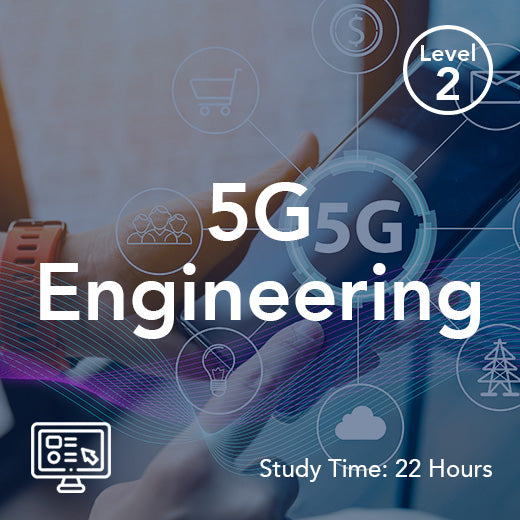
5G Engineering (On-Demand)
This 5G Engineering on-demand training course is designed to provide a comprehensive technical introduction to 5G technology. The course covers the design goals, development schedule, principles, design, and implementation of the 5G air interface, radio access network, and core network. Participants will gain a deep understanding of the operation of the 5G system through illustrated course books, videos, tests, and full tutor support. Engineers who are new to the field of mobile communications or those already working in the industry can benefit greatly from this course. Familiarity with telecommunications and general engineering terminology is assumed, and some understanding of LTE cellular systems would be beneficial for participants looking to get the most out of this training. By enrolling in this course, participants will delve into key topics such as 5G introduction, use cases, air interface principles, radio access network architecture, core network protocols, network function virtualisation, interworking between 5G, LTE, and Wi-Fi, and much more. With a total duration of 22 hours, this on-demand training course offers a flexible and convenient way to enhance your knowledge and skills in the rapidly evolving field of 5G technology. Who would benefit This course is intended for engineers either new to, or already working in, mobile communications. Prerequisites Familiarity with telecommunications and general engineering terminology is assumed. Some understanding of LTE cellular systems would be beneficial. Topic Areas Include 5G introduction, key features and standardisation Use cases and performance objectives Principles of the air interface: radio spectrum, OFDMA and multiple antennas Air interface protocol stack Architecture of the air interface physical layer Procedures for data transmission and reception on the 5G air interface Radio access network architecture and protocols Non-standalone and standalone deployment options Core network architecture and protocols Network function virtualisation and network slicing Interworking and compatibility between 5G, LTE and Wi-Fi PDU connectivity, Quality of Service and service provision Signalling procedures in the 5G network
£1,815.00
-
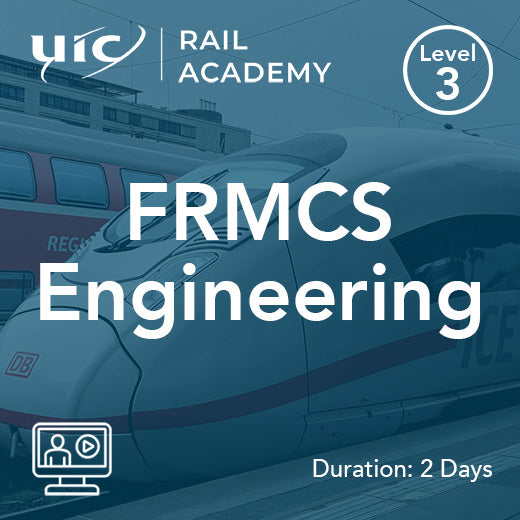
FRMCS V2 Engineering (Live)
GSM-R end of life is anticipated to be around 2030 which only leaves a few years to find a replacement system. The International Union of Railways (UIC) have published a document called FRMCS- Future Railway Mobile Communications System which outlines what will be required of a future system. The railway community have detailed the communications requirements of the future railway networks and are looking for telecommunications manufacturers and standards bodies to provide a suitable solution. This technical course is aimed at engineers planning to deploy FRMCS as a successor to GSM-R. It identifies the specifications for FRMCS, the design aims, architecture of the On-Board systems, trackside systems and the transport network. Additionally, the course details the capabilities of FRMCS, operational procedures and looks at possible migration scenarios with GSM-R. Now fully updated to include FRMCS V2 specifications. Prerequisites Attendees will ideally have worked in the rail industry with GSM-R or have a telecommunications background gained from working in the commercial cellular industry. Topic Areas Include FRMCS – An Introduction FRMCS Reference Architecture FRMCS On-Board Architecture FRMCS Trackside Components Voice Application Subsystem FRMCS Location and Positioning System 5G FRMCS Addressing The SIP Core Mission Critical Architecture and Procedures FRMCS Operation Radio Planning and Migration MCVideo Benefits and Learning Objectives Learn about the standards-based approach to developing FRMCS Be aware of the key features and services FRMCS will bring to the railways Discover how 3GPP 5G technology can be used to support FRMCS Describe the potential migration paths from GSM-R to FRMCS Understand the radio spectrum issues associate with migration Understand how 3GPP Mission Critical applications can be adopted by FRMCS Certified by Institution of Railway Signal Engineers (IRSE) The Institution of Railway Signal Engineers (IRSE) certifies that the syllabus for the FRMCS Engineering course is appropriate for meeting the stated objectives of that course. For more information about the scope of the certification process provided by the IRSE please see the IRSE website www.irse.org. Trainer: Les Granfield Les is a technical trainer with 35 years of experience. His expertise extends across a wide range of telecommunications technologies. He specializes in 5G, GSM-R, ERTMS/ETCS, FRMCS, radio access networks, radio planning, radio access network optimization and Push to Talk over Cellular (PoC). Courses run 9am-12.30pm CET each day.
£2,516.00
-
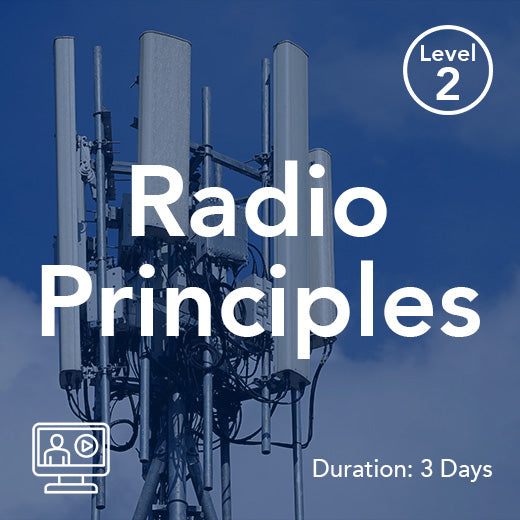
Radio Principles
The definitive course in Radio Communications The world has seen a phenomenal growth in the application and use of radio technology. What haven’t changed, however, are the principles upon which all of these technologies are built. The Radio Principles course provides an in-depth understanding of these principles on which radio technologies are built, taking students on a logical and detailed path through the various aspects of the theory, and practice, of radio communications. Through attendance on this course, delegates will build an understanding of how radio works and how this impacts manufacturers, users and operators of radio technology. Our Radio Principles training course is designed to provide a comprehensive understanding of radio principles and technologies. Whether you are new to the field or looking to enhance your existing knowledge, this course covers all the essential topics including modulation techniques, transmission lines, antennas, and more. Our expert instructors will guide you through the fundamentals of radio communication, helping you gain the skills and confidence needed to excel in this dynamic industry. By enrolling in our Radio Principles training course, you will have the opportunity to learn from industry professionals with years of experience in the field. Our interactive sessions and hands-on exercises will give you practical insights into the latest advancements in radio technology, helping you stay ahead of the curve. Whether you are a beginner or an experienced professional, this course will provide you with the knowledge and skills needed to succeed in the fast-paced world of radio communication. Who would benefit Those requiring an understanding of the principles and concepts of radio that underpin today’s radio technologies. Prerequisites Some experience in telecommunications engineering is beneficial but the course is also suitable for delegates with an aptitude for technical subjects. Topic Areas Include The use and management of the radio spectrum Waveform fundamentals and baseband information Power levels and measurementsAnalogue and digital modulation techniques Simplex, semi-duplex and duplex - FDD and TDD Multiplexing – FDMA, TDMA, CDMA and OFDMA Transmitters and receivers Antennas and transmission lines Radio propagation mechanisms Introduction to coverage prediction Principles of cellular coverage techniques Diversity and MIMO An overview of fixed and mobile radio technologies in use today
£2,660.00
-
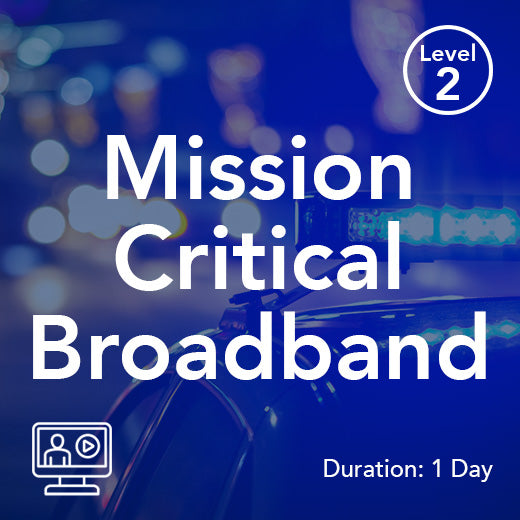
Mission Critical Broadband (MCB)
Understanding where we've come from, and where we're headed – A Primer The hottest topics in the Land Mobile Radio (LMR) market today is the use of LTE/4G/5G as the LMR market is heading for a major change in the delivery of information to and from their mobile portable and in-vehicle devices in the field. As the world embraces 4G/LTE and 5G mobile broadband technologies a shift in culture from voice-centric to information-centric operations - the options and therefore complexity expands exponentially. This course provides fundamental supplier independent knowledge about LMR, the evolving Broadband technologies and its specific features in Mission Critical Communications. Module 1: Overview Of Commercial & Mission Critical Networks The aim of this module is to introduce the broad functional similarities of Commercial and MCC networks whilst explaining the distinct differences in the requirements of the respective user populations. Mission Critical Networks & Commercial Mobile Broadband Networks Mobile Broadband Network Technologies LMR Mission Critical Network Technologies Module 2: Mission Critical Broadband & Interworking The aim of this module is to explain the changes made to the LTE standards to allow the realization of a Mission Critical Mobile Broadband technology, and explains the deployment options available to users. Spectrum Security Mission Critical Mobile Broadband Who would benefit? Those working with Private and Professional Mobile Communications wishing to become familiar with Broadband LTE 4G, 5G technologies and the services it can provide along with an appreciation of how Broadband networks can interwork with existing LMR technologies, such as TETRA, P25, DMR and Analogue systems.
POA: Private Course
-
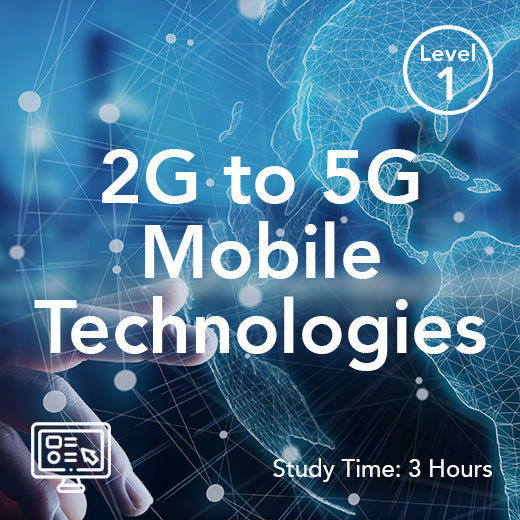
2G to 5G Mobile Technologies (On-Demand)
Our 2G to 5G Mobile Technologies Training Course is designed to provide professionals in the telecommunications industry with the knowledge and skills needed to understand and work with the latest mobile technologies. With the rapid evolution of mobile networks, staying up-to-date with the latest advancements is crucial for professionals looking to advance their careers in this field. Our comprehensive course covers everything from the basics of 2G technology to the cutting-edge developments in 5G networks.By enrolling in our training course, participants will gain a deep understanding of the principles and technologies behind 2G, 3G, 4G, and 5G networks. They will learn about the key features and capabilities of each generation, as well as the challenges and opportunities presented by the transition to 5G. Our expert instructors will guide participants through hands-on exercises and real-world case studies to ensure they have the practical skills needed to succeed in this dynamic industry.Whether you are a seasoned professional looking to upgrade your skills or a newcomer to the telecommunications field, our 2G to 5G Mobile Technologies Training Course will provide you with the knowledge and expertise needed to excel in this fast-paced industry. Stay ahead of the curve and advance your career with our industry-leading training program. This self-paced on-demand distance learning course features illustrated course books, videos, tests and full tutor support. Who would benefit This course is suitable for engineering, technical sales, technical management and other staff who require a general technical overview of mobile technologies but who do not need to invest the time necessary to learn about each technology in depth. Prerequisites A basic understanding of telecoms principles would be beneficial. Topic Areas Include: An overview of basic radio and cellular techniques and technologies Network Generations from 2G to 5G 3GPP Release programme An overview of 2G (GSM) network architecture and functionality GSM TDMA air interface operating principles GPRS and EDGE upgrades to GSM GSM services TETRA networks An overview of 3G (UMTS) network architecture and functionality UMTS WCDMA air interface operating principles HSPA and HSPA+ upgrades to UMTS An overview of 4G (LTE) network architecture and functionality LTE OFDMA air interface operating principles Evolved Packet Core (EPC) operation Small cells and heterogeneous networks Self Organising Networks (SON) LTE voice options LTE Advanced and LTE Advanced Pro Wi-Fi/Cellular interworking LTE operation in unlicensed frequency bands Machine Type Communications (MTC) LTE for public safety Introduction to 5G 3GPP use cases for 5G Performance targets for 5G Radio Spectrum for 5G 5G OFDMA air interface 5G System Architecture Non Standalone (NSA) and Standalone (SA) New Radio (NR) 5G Core Network Functions
£750.00
-
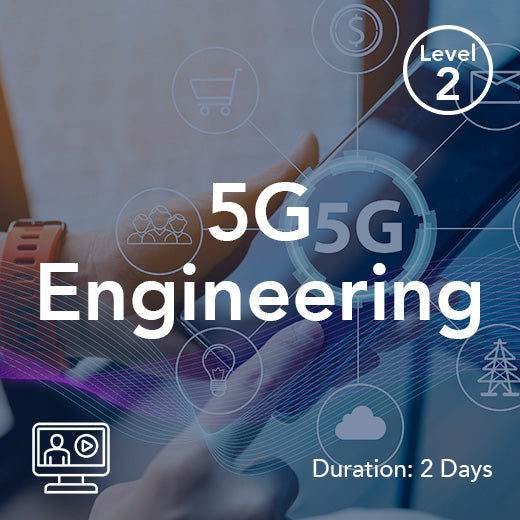
5G Engineering
5G Engineering training course provides a comprehensive technical introduction to the world of 5G. From understanding the design goals and development schedule for 5G to delving into the principles, design, and implementation of the 5G air interface, radio access network, and core network, this course covers it all. Perfect for engineers new to or already working in mobile communications, this course assumes familiarity with telecommunications and general engineering terminology, with some understanding of LTE cellular systems being beneficial. Our course covers a wide range of topic areas, including 5G introduction, key features, and standardization, use cases and performance objectives, principles of the air interface such as radio spectrum, OFDMA, and multiple antennas, air interface protocol stack, architecture of the air interface physical layer, procedures for data transmission and reception on the 5G air interface, radio access network architecture and protocols, core network architecture and protocols, network function virtualization and network slicing, interworking and compatibility between 5G, LTE, and Wi-Fi, PDU connectivity, Quality of Service, service provision, and signalling procedures in the 5G network. Join us for this in-depth course and take your knowledge of 5G to the next level. Who would benefit This course is intended for engineers either new to, or already working in, mobile communications. Prerequisites Familiarity with telecommunications and general engineering terminology is assumed. Some understanding of LTE cellular systems would be beneficial. Topic Areas Include 5G introduction, key features and standardisation Use cases and performance objectives Principles of the air interface: radio spectrum, OFDMA and multiple antennas Air interface protocol stack Architecture of the air interface physical layer Procedures for data transmission and reception on the 5G air interface Radio access network architecture and protocols Non-standalone and standalone deployment options Core network architecture and protocols Network function virtualisation and network slicing Interworking and compatibility between 5G, LTE and Wi-Fi PDU connectivity, Quality of Service and service provision Signalling procedures in the 5G network
£1,815.00
-
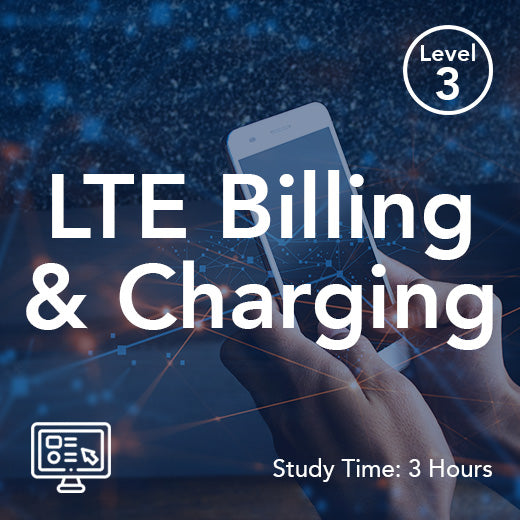
LTE Billing and Charging (On-Demand)
Our LTE Billing and Charging Training Course provides a comprehensive technical overview of the billing and charging architecture specifically designed for 4G LTE networks. Participants will gain insights into LTE bearer, traffic flow, and Quality of Service (QoS) concepts, as well as an in-depth understanding of the architecture of both online and offline billing systems. Key nodes, interfaces, and protocols used for transporting billing and charging information will be explored, along with the interactions with the billing system during basic LTE procedures. This course is ideal for engineers, designers, managers, and individuals involved in the development, deployment, or operation of LTE billing and charging systems. Familiarity with the LTE Evolved Packet Core is assumed, and experience with 2G or 3G billing systems would be beneficial. Topics covered include EPS bearer concepts, LTE QoS models, packet flows, deep packet inspection, policy and charging control, flow-based charging, billing architecture, charging data capture points, protocols (Diameter, CAP), interfaces (Gy, Gz, Rf, Ro), charging criteria, CDR formats, CDR generation, and charging interaction with basic LTE procedures. Join us for this informative and practical training session to enhance your knowledge and skills in LTE billing and charging. This self-paced on-demand distance learning course features illustrated course books, videos, tests and full tutor support. Who would benefit Engineers, designers, managers and others involved in the development, deployment or operation of LTE billing and charging systems. Prerequisites Familiarity with the LTE Evolved Packet Core is assumed. Experience of 2G or 3G billing systems would be beneficial. Topic Areas Include Review of EPS bearer concepts and LTE QoS models Packet flows, service data flows and traffic flow aggregates Deep packet inspection – heuristic algorithms and bearer-aware applications Outline of policy and charging control LTE billing and charging concepts Flow-based charging Billing architecture Online and offline charging systems Charging data capture points (S-GW, PDN-GW) IMS charging capture points Charging Data Function (CDF) Protocols – Diameter, CAP Interfaces – Gy, Gz, Rf, Ro and others Charging criteria – time-based, volume-based, application-based CDR formats CDR generation Charging interaction with basic LTE procedures
£95.00
-
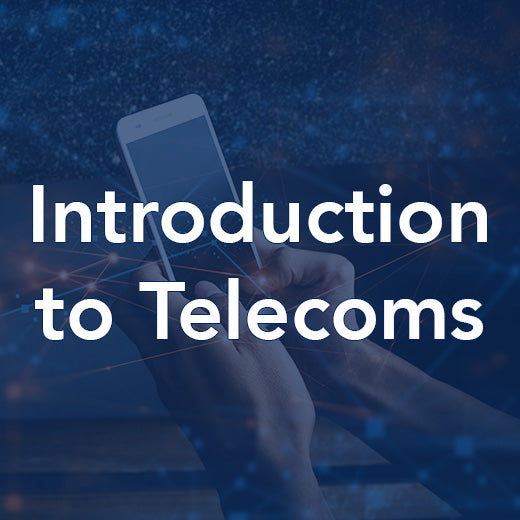
Introduction to Telecoms
The Introduction to Telecoms Training Course is designed to provide participants with a comprehensive understanding of the core technologies used in fixed, mobile, and IP-based telecoms networks. Over the course of 3 days, attendees will delve into the fundamentals of networking technologies, including switching, transmission, and signalling, as well as the services that they support. The training also covers next-generation networking in an all-IP environment, ensuring that participants are equipped with the knowledge needed to excel in the telecommunications industry. Ideal for those currently working in or looking to enter the telecommunications field, this course is perfect for individuals who need a solid grasp of the functions and services offered by modern networks. Participants should have a basic mathematical ability and a technical aptitude, with the intention to pursue a technical role in the industry. By exploring topics such as telecoms evolution, network components and services, and mobile cellular systems, attendees will gain valuable insights into the ever-evolving world of telecommunications. Who would benefit Those working in or entering the telecommunications industry who need to understand the functions and services provided by modern networks. Prerequisites Mathematical ability and aptitude for technical subjects, with the intention to progress in a technical role. Topic Areas Include Telecoms evolution Network components and services The PSTN and ISDN: access and core networks Basic analogue and digital information concepts Time division multiplexing and switching techniques Transmission systems: PDH, SDH, WDM and OTN Mobile cellular systems: 2G, 2.5G, 3G, 4G/LTE and 5G Packet-switched techniques IP, Ethernet, the Internet, ISPs and Internet Services Fixed and Mobile Broadband access technologies Next Generation fixed and mobile networks IP Multimedia Subsystem
£2,660.00
-
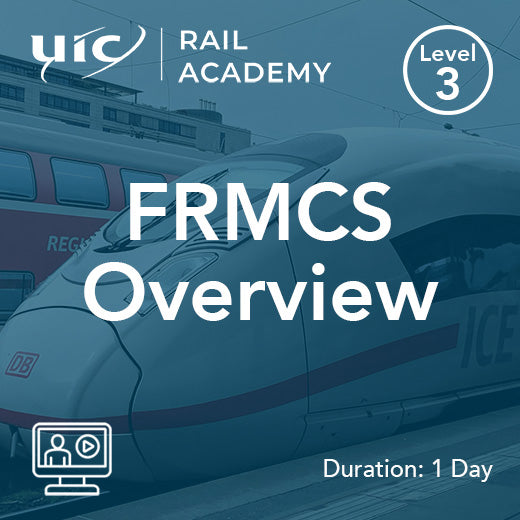
FRMCS V2 Overview (Live)
This course is aimed at non-technical people or those in management roles that need an introduction to FRMCS. It outlines the need for FRMCS and introduces the standards that are required. The course also discusses the issues with the current radio spectrum allocations and how FRMCS and GSM-R may co-exist in the rollout phase. Also discussed the technology known as 5G that will be an integral part of FRMCS. Now fully updated to include FRMCS V2 specifications Course Contents FRMCS – An Introduction FRMCS Reference Architecture 5G Mission Critical Architecture and Procedures Radio Planning and Migration MCVideo Certified by Institution of Railway Signal Engineers (IRSE) The Institution of Railway Signal Engineers (IRSE) certifies that the syllabus for the FRMCS Overview course is appropriate for meeting the stated objectives of that course. For more information about the scope of the certification process provided by the IRSE please see the IRSE website www.irse.org. Trainer: Les Granfield Les is a technical trainer with 35 years of experience. His expertise extends across a wide range of telecommunications technologies. He specializes in 5G, GSM-R, ERTMS/ETCS, FRMCS, radio access networks, radio planning, radio access network optimization and Push to Talk over Cellular (PoC).
£1,336.00
-
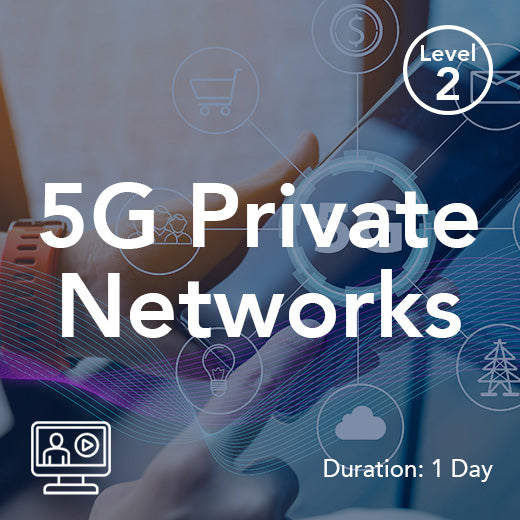
5G Private Networks
5G private networks have emerged as a transformative technology enabling businesses to unlock new levels of efficiency, productivity, and innovation. This course provides participants with a good understanding of the principles, technologies, and best practices involved in implementing private 5G networks.Participants will explore the specific characteristics and advantages of private networks, including dedicated spectrum, enhanced security, and network slicing capabilities. They will gain practical insights into the planning and design of private 5G networks, covering topics that include the radio aspects, network architecture, and integration with existing infrastructure. They will also learn about the deployment considerations unique to different industry verticals, such as manufacturing, logistics, healthcare, and public safety. Real-world case studies are included to enhance the learning experience and enable participants to apply their knowledge effectively in diverse industry contexts. Who Would Benefit The course is intended for network architects and engineers who are involved with the design, optimization, management, monitoring or testing of Private Networks. Prerequisites An engineering background with knowledge of core and radio access network technologies is assumed. A good understanding and experience of 5G and LTE networks would be desirable. Course Contents Introduction to Private Cellular Networks Private Network Use-Cases and Verticals The Benefits of 5G Technology for Enterprise Challenges Spectrum Access and Mobility Control Management and Security Multi-Access Edge Compute (MEC)
£980.00
-
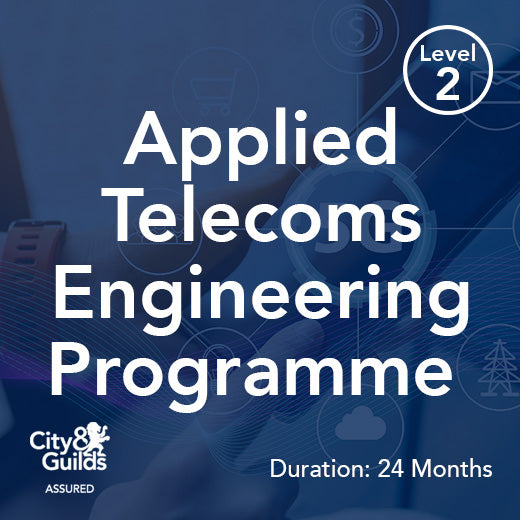
Applied Telecoms Engineering Programme (Cellular Radio Engineer)
The Applied Telecoms Engineering Programme (Cellular Radio Engineer Track) distance learning programme provides learners with a qualification that demonstrates their knowledge of the technologies underpinning the telecoms industry with a focus on cellular radio engineering. Students will gain a through foundation in the telecoms industry and the technologies on which it’s based as well as a comprehensive understanding of the technologies underpinning radio access networks and techniques needed to design, plan, build, monitor and optimise modern cellular radio networks. This programme has been assured by City & Guilds. Assured status provides validation and recognition for the learner. It is a symbol of learning excellence and quality and is a reassurance that the training undertaken meets best practice standards. Applied Telecoms Engineering Programme (Cellular Radio Engineer Track) Syllabus Foundation Courses Technology Fundamentals Course Modules: Defining Telecoms Background to the Telecom Network Digital Fixed Telecom Networks Data Networks Mobile Networks and Wi-Fi Broadband and Emerging Networks 2G to 5G Mobile Technologies Course Modules: Principles of Mobile Cellular Networks 2nd Generation Mobile Networks 3rd Generation Mobile Networks 4th Generation Mobile Networks 5th Generation Mobile Networks Telecoms – as an Industry and Business Course Modules: Telecoms Industry & Business Dynamics The Technology Explained & Evaluated Telecoms Industry & Market Update Specialist Courses LTE Air Interface Course Modules: LTE Overview OFDM Principles Physical Layer Structure Layer 2 Protocols Radio Resource Control LTE-Advanced Lower Layer Procedures 5G Air Interface Course Modules: Principles of the 5G New Radio Introduction to the Physical Layer Physical Layer Implementation and Procedures Higher Layer Protocols Signalling Procedures What you will learn: At the end of the programme successful students will be able to: Develop a fundamental understanding of the technologies underpinning modern telecoms networks, the industry structure and its key stakeholders . Gain a detailed understanding of the air interface for LTE radio access (incl. OFDMA principles, channel structures, connectivity and mobility management and radio link control functions.) Have a detailed technical understanding of the air interface for the 5G New Radio, the principles of mm wave and multiple antenna communications, the architecture of the AI’s physical layer, the higher layer air interface protocols, and the signalling procedures. Expand their learning further by studying two elective modules to qualify for the Diploma in Telecoms. What sets the programme apart? Focused Learning Pathways – guide you through the material and enable you to become an expert in your chosen field. Flexible Learning – study at a time, location and pace of your choice. Full Tutor support – from industry experts with decades of experience throughout your studies. Extended Learning – Diploma students have the opportunity to study 3 additional courses. 24 months access – allowing you to refer back to the material after your studies. Digital Badges and Course Certificate – demonstrate the depth of your knowledge. About City & Guilds City & Guilds is a household brand and a global leader in skills development. Over one million people earn a City & Guilds qualification every year, providing them with the skills they need to thrive in the workplace.In the global economy, the ability to compete depends on building a skilled, competent and confident workforce. City & Guilds understands the value of portable skills and globally recognised standards that enable people and organisations to succeed. It partners with Governments, employers and educators in over 50 countries, across five continents, to advise them on developing high-quality skills training that meets the needs of the global workforce, without compromising on local demands. Enrolment Fees: £2,995 (+VAT) Programme Duration: 24 months (Programme is On-Demand, learners can start at any time) Bespoke In-Company Schemes The Applied Telecoms Engineering Programme provide the ideal structure for formalising training programmes for teams across your business. Contact us on info@wraycastle.com for more information.
£2,995.00
-
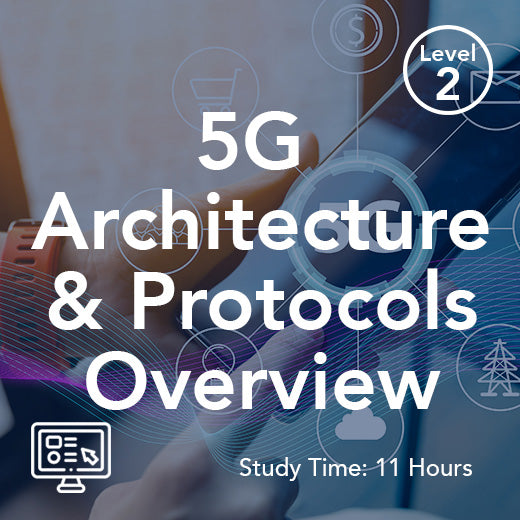
5G Architecture and Protocols Overview (On-Demand)
This 5G Architecture and Protocols Overview on-demand training course provides a comprehensive technical introduction to the 5G network, covering design goals, development schedules, and the core and radio access networks of 5G. Engineers new to or already working in mobile communication networks will benefit from this course, which assumes familiarity with telecommunications and general engineering terminology, with some understanding of LTE cellular systems being beneficial. The course covers a range of topic areas, including 5G introduction, key features, and standardization, use cases and performance objectives, radio access network architecture and protocols, core network architecture and protocols, network function virtualization, network slicing, interworking and compatibility between 5G, LTE, and Wi-Fi, PDU connectivity, Quality of Service, service provision, and signaling procedures in the 5G network. This self-paced on-demand distance learning course features illustrated course books, videos, tests and full tutor support. Who would benefit This course is intended for engineers either new to, or already working in, mobile communication networks. Prerequisites Familiarity with telecommunications and general engineering terminology is assumed. Some understanding of LTE cellular systems would be beneficial. Topic Areas Include: 5G introduction, key features and standardisation Use cases and performance objectives Radio access network architecture and protocols Non standalone and standalone deployment options Core network architecture and protocols Network function virtualisation and network slicing Interworking and compatibility between 5G, LTE and Wi-Fi PDU connectivity, Quality of Service and service provision Signalling procedures in the 5G network
£500.00
-

Artificial Intelligence (AI) Fundamentals for Telecoms (On-Demand)
The Artificial Intelligence Fundamentals course is designed to provide participants with a comprehensive introduction to the field of artificial intelligence (AI). Through a combination of theoretical concepts and practical applications, participants will gain a solid foundation in AI and its various subfields, including machine learning, natural language processing, computer vision, and robotics. We explore the use of AI in industry, and in particular in Telecoms and related sectors. By the end of the course, participants will have a strong grasp of AI concepts, techniques, and their real-world applications – particularly in telecoms. They will be equipped to pursue further studies in AI or apply their knowledge to diverse domains where AI plays a significant role. Prerequisites There are no specific prerequisites for this course. However, a basic understanding of programming concepts would be beneficial. Course Contents Introduction to Artificial Intelligence Machine Learning Natural Language Processing (NLP) Computer Vision Robotics and Autonomous Systems AI in Industry Ethics and Responsible AI
£95.00
-

Fundamentals of Telecommunications (On-Demand)
This course will cover a wide range of topics, starting with the basics of services and connectivity. It will provide insight into the evolution of telecommunication networks over time, reflecting on both historical advancements and future trends. We will begin with an introduction to the foundational aspects of telecom services and connectivity, setting the stage for more detailed explorations. We will then delve into fixed access technologies, starting with traditional copper pair connectivity and progressing through the evolutionary phases of fixed broadband access. This will include a thorough discussion of the technologies that have shaped and continue to influence fixed network landscapes. The mobile sector will receive a focused analysis beginning with the fundamental cellular concepts. We will explore the evolution of mobile broadband, especially under the frameworks established by the 3rd Generation Partnership Project (3GPP), covering technologies from GSM to advanced LTE and 5G networks. An essential component of this course will be a deep dive into operational support systems (OSS) and business support systems (BSS), which are critical for managing modern telecommunications services. We will examine the key platforms that support telecom services, such as billing, customer service, and network management systems. The course will also cover the burgeoning area of the Internet of Things (IoT), detailing how this technology integrates into existing telecom infrastructures and the new opportunities it creates. Additionally, we will consider the infrastructure backbone of the telecom industry, focusing on data centres and the relative costs associated with telecom infrastructure, excluding spectrum costs. Course Contents: Introduction Services and Connectivity - Evolution Fixed Access Mobile Access Support Systems Infrastructure
£95.00
-
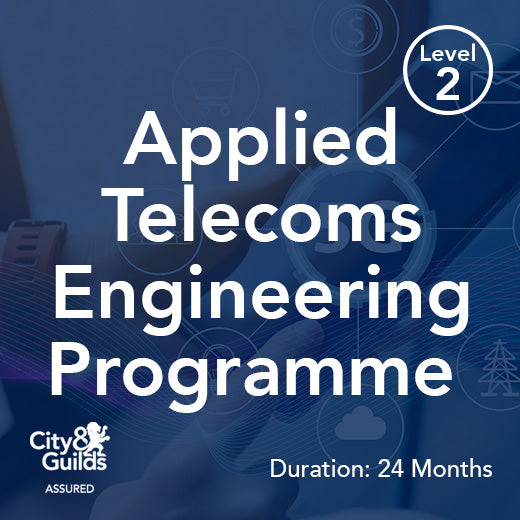
Applied Telecoms Engineering Programme (5G Engineer Track)
The Applied Telecoms Engineering Programme (5G Engineer Track)distance learning programmes provides learners with a certified qualification that demonstrates their knowledge of the technologies underpinning the telecoms industry with a focus on 5G network architecture and protocols and the 5G Air Interface. This programme has been assured by City & Guilds. Assured status provides validation and recognition for the learner. It is a symbol of learning excellence and quality and is a reassurance that the training undertaken meets best practice standards. Applied Telecoms Engineering Programme (5G Engineer Track) Syllabus Foundation Courses Technology Fundamentals Course Modules: Defining Telecoms Background to the Telecom Network Digital Fixed Telecom Networks Data Networks Mobile Networks and Wi-Fi Broadband and Emerging Networks 2G to 5G Mobile Technologies Course Modules: Principles of Mobile Cellular Networks 2nd Generation Mobile Networks 3rd Generation Mobile Networks 4th Generation Mobile Networks 5th Generation Mobile Networks Telecoms – as an Industry and Business Course Modules: Telecoms Industry & Business Dynamics The Technology Explained & Evaluated Telecoms Industry & Market Update Specialist Courses 5G Architecture and Protocols Course Modules: Introduction to 5G Radio Access Network Architecture Core Network Architecture Data Transport 5G Protocols 5G Procedures Releases 16 and 17 5G Air Interface Course Modules: Principles of the 5G New Radio Introduction to the Physical Layer Physical Layer Implementation and Procedures Higher Layer ProtocolsSignalling Procedures What you will learn: At the end of the programme successful students will be able to: Develop a fundamental understanding of the technologies underpinning modern telecoms networks, the industry structure and its key stakeholders . Understand the architecture and interfaces used by 5G, the protocols used for signalling and data transport, the provision of services over a 5G network, and the procedures for signalling and system operation. Master the principles of mmWave and multiple antenna communications, the architecture and implementation of the AI's physical layer, the higher layer AI protocols. What sets the programme apart? Focused Learning Pathways – guide you through the material and enable you to become an expert in your chosen field. Flexible Learning – study at a time, location and pace of your choice. Full Tutor support – from industry experts with decades of experience throughout your studies. Extended Learning – Diploma students have the opportunity to study 3 additional courses. 24 months access – allowing you to refer back to the material after your studies. Digital Badges and Course Certificate – demonstrate the depth of your knowledge. About City & Guilds City & Guilds is a household brand and a global leader in skills development. Over one million people earn a City & Guilds qualification every year, providing them with the skills they need to thrive in the workplace.In the global economy, the ability to compete depends on building a skilled, competent and confident workforce. City & Guilds understands the value of portable skills and globally recognised standards that enable people and organisations to succeed. It partners with Governments, employers and educators in over 50 countries, across five continents, to advise them on developing high-quality skills training that meets the needs of the global workforce, without compromising on local demands. Enrolment Fees: £2,995 (+VAT) Programme Duration: 24 months (Programme is On-Demand, learners can start at any time) Bespoke In-Company Schemes The Applied Telecoms Engineering Programme provide the ideal structure for formalising training programmes for teams across your business. Contact us on info@wraycastle.com for more information.
£2,995.00
-
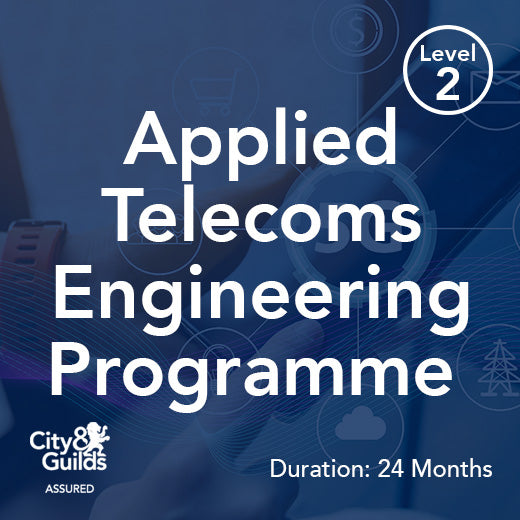
Applied Telecoms Engineering Programme (Core Network Engineer)
The Applied Telecoms Engineering Programme (Core Network Engineer Track) distance learning programmes provides learners with a certified qualification that demonstrates their knowledge of the technologies underpinning the telecoms industry with a focus on core network engineering. Students will gain a through foundation in the telecoms industry and the technologies on which it’s based as well as a deep understanding of the core network procedures, processes and service provision concepts for 4G and 5G Networks. This programme has been assured by City & Guilds. Assured status provides validation and recognition for the learner. It is a symbol of learning excellence and quality and is a reassurance that the training undertaken meets best practice standards. Applied Telecoms Engineering Programme (Core Network Engineer Track) Syllabus Foundation Courses Technology Fundamentals Course Modules: Defining Telecoms Background to the Telecom Network Digital Fixed Telecom Networks Data Networks Mobile Networks and Wi-Fi Broadband and Emerging Networks 2G to 5G Mobile Technologies Course Modules: Principles of Mobile Cellular Networks 2nd Generation Mobile Networks 3rd Generation Mobile Networks 4th Generation Mobile Networks 5th Generation Mobile Networks Telecoms – as an Industry and Business Course Modules: Telecoms Industry & Business Dynamics The Technology Explained & Evaluated Telecoms Industry & Market Update Specialist Courses LTE Evolved Packet Core Course Modules: LTE Overview Evolved Packet Core Data Transport in the EPC Major Protocols EPC Operation Release 9 and Beyond 5G Architecture and Protocols Course Modules: Introduction to 5G Radio Access Network Architecture Core Network Architecture Data Transport 5G Protocols 5G Procedures Releases 16 and 17 What you will learn: At the end of the programme successful students will be able to: Develop a fundamental understanding of the technologies underpinning modern telecoms networks, the industry structure and its key stakeholders . Describe the Evolved Packet Core for LTE systems, architecture, interfaces, service provision concepts, application of IP technologies and the overall protocol architectures. Understand the architecture and interfaces used by 5G, the protocols used for signalling and data transport, the provision of services over a 5G network, and the procedures for signalling and system operation. Expand their learning further by studying two elective modules to qualify for the Diploma in Telecoms. What sets the programme apart? Focused Learning Pathways – guide you through the material and enable you to become an expert in your chosen field. Flexible Learning – study at a time, location and pace of your choice. Full Tutor support – from industry experts with decades of experience throughout your studies. Extended Learning – Diploma students have the opportunity to study 3 additional courses. 24 months access – allowing you to refer back to the material after your studies. Digital Badges and Course Certificate – demonstrate the depth of your knowledge. About City & Guilds City & Guilds is a household brand and a global leader in skills development. Over one million people earn a City & Guilds qualification every year, providing them with the skills they need to thrive in the workplace.In the global economy, the ability to compete depends on building a skilled, competent and confident workforce. City & Guilds understands the value of portable skills and globally recognised standards that enable people and organisations to succeed. It partners with Governments, employers and educators in over 50 countries, across five continents, to advise them on developing high-quality skills training that meets the needs of the global workforce, without compromising on local demands. Enrolment Fees: £2,995 (+VAT) Programme Duration: 24 months (Programme is On-Demand, learners can start at any time) Bespoke In-Company Schemes The Applied Telecoms Engineering Programme provide the ideal structure for formalising training programmes for teams across your business. Contact us on info@wraycastle.com for more information.
£2,995.00
-
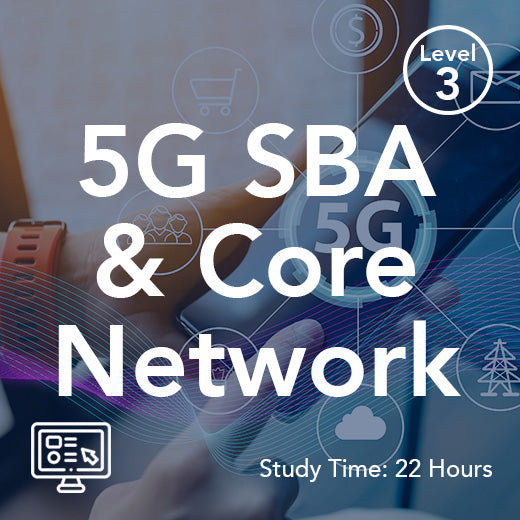
5G Service Based Architecture and Core Network (On-Demand)
Our 5G Service Based Architecture and Core Network Training Course is designed to provide a comprehensive understanding of core network functions within the SBA, as well as the protocols and technologies that support the 5G Core. Through example procedures and in-depth exploration of the Service Based Interface (SBI) and Service APIs, participants will gain valuable insights into key 5G enabling principles such as virtualization and network slicing. Additionally, the course covers security on the SBI, introducing new network functions and techniques that enhance the security features of the core network domain. Ideal for professionals involved in the design, deployment, and development of 5G Service Based Architecture and the 5G Core, this technical course requires some prior knowledge or experience with the 5G system from a technical perspective. Topics covered include 5G introduction and deployment options, core network functions, supporting protocols and technologies, SBI security, and more. Participants will benefit from live online sessions led by industry experts, providing a dynamic and interactive learning experience. For those looking to explore, test, optimize, and troubleshoot the 5G system beyond the theoretical, we also offer an optional 5G Virtual Lab Module. This fully emulated environment allows participants to experiment with configurations for Network Functions and customize settings for signaling scenarios, providing a hands-on approach to developing a deeper understanding of the operation of the 5G system. This self-paced on-demand distance learning course features illustrated course books, videos, tests and full tutor support. Who would benefit This course is designed for those involved in the design, deployment and development of the 5G Service Based Architecture and the 5G Core. Prerequisites This is a technical course, so experience or knowledge of the 5G system from a technical perspective would be an advantage. Topic Areas Include 5G Introduction and Deployment Options The 5G Core Network Functions 5G Core Supporting Protocols and Technologies The Service Based Interface (SBI) and Service APIs Explained Procedures Deployment options SBI Security
£750.00
-
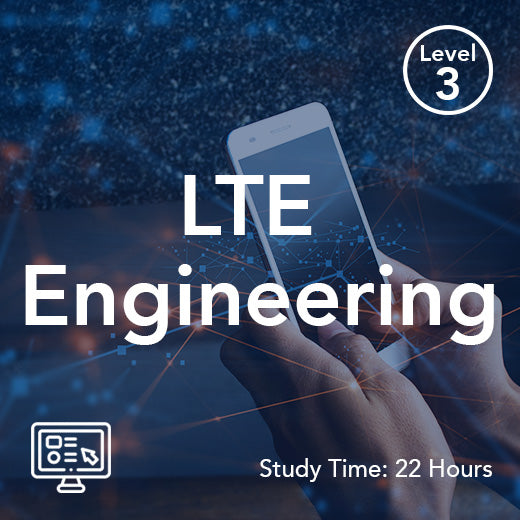
LTE Engineering (On-Demand)
A technical introduction and overview of LTE and LTE-Advanced, including the air interface, radio access network, core network and other key associated technologies. This self-paced on-demand distance learning course features illustrated course books, videos, tests and full tutor support. Who would benefit This course is intended for engineers either new to, or already working in, mobile communications. Prerequisites Familiarity with telecommunications and general engineering terminology is assumed and some understanding of 2G and 3G cellular systems would be beneficial. Topic Areas Include High level architecture of LTE Basic principles of OFDMA and SC-FDMA Air interface protocol stack Structure of the air interface physical layer E-UTRAN architecture, interfaces and protocols EPC architecture, interfaces and protocols LTE state diagrams Principles of bearers and Quality of Service (QoS) Voice options for LTE Power-on procedures UE procedures in idle and connected modes Enhancements in LTE-Advanced
£750.00
-
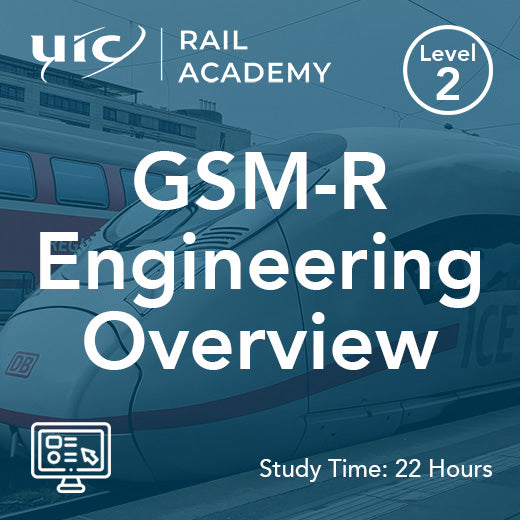
GSM-R Engineering Overview (On-Demand)
The GSM-R Engineering Overview Training Course is a comprehensive program designed for network engineers looking to deepen their understanding of GSM-R networks and operations. Part of the UIC Rail Academy, this course covers all principles of GSM-R networks and provides a detailed study of the services, features, and technology involved. Ideal for individuals in technical roles within the rail industry, this course offers a broad overview of GSM-R services and technology. Participants will gain insights into GSM and GSM-R networks, network architectures, identities, coverage, procedures, and the European Train Control System. A basic understanding of cellular radio networks and railway signaling is recommended as a prerequisite for this course. Who would benefit Those in or entering technical roles within the GSM-R industry who require a broad overview of the services, features and technology of GSM-R. Prerequisites A basic understanding of cellular radio networks and railway signalling, as well as the ability to comprehend technical subjects, would be useful. Topic Areas Include Introduction to GSM and GSM-R Networks GSM Network Architecture GPRS Network Architecture GSM-R Network Architecture GSM-R Services] GSM-R Identities GSM-R Coverage Network Access GSM-R Procedures European Train Control System Certified by Institution of Railway Signal Engineers (IRSE) The Institution of Railway Signal Engineers (IRSE) certifies that the syllabus for the GSM-R Engineering course is appropriate for meeting the stated objectives of that course. For more information about the scope of the certification process provided by the IRSE please see the IRSE website www.irse.org.
£1,820.00
-
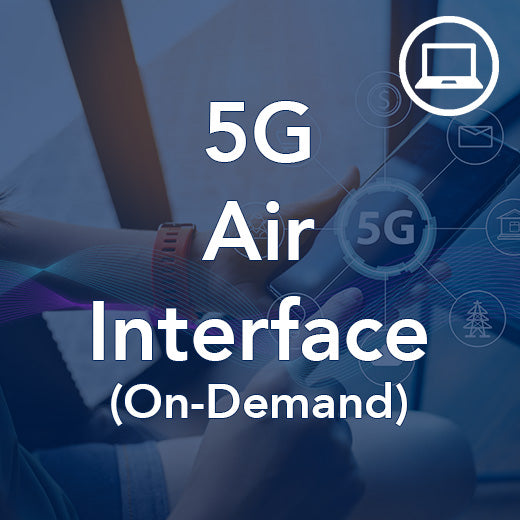
5G Air Interface (On-Demand)
Our 5G Air Interface training course provides a comprehensive technical overview of the air interface for the 5G New Radio (5G NR). This course delves into the principles of millimetre wave and multiple antenna communications, the architecture and implementation of the air interface's physical layer, as well as the higher layer air interface protocols and signalling procedures for both idle and active 5G devices. Ideal for engineers and professionals involved in equipment design, operation, optimization, or monitoring on the 5G air interface, this course assumes an engineering background with some knowledge of general radio principles and digital radio systems. While a basic understanding of 5G and experience with LTE radio systems are desirable, they are not mandatory prerequisites.In addition our course covers a range of topic areas including 5G introduction, use cases, and standardization, radio spectrum and millimetre wave communications, principles and implementation of multiple antennas in 5G, and more. For those looking to deepen their understanding further, we also offer an optional 5G Virtual Lab Module where participants can explore, test, optimize, and troubleshoot the 5G system in a fully emulated environment. This self-paced on-demand distance learning course features illustrated course books, videos, tests and full tutor support. Who would benefit The course is intended for engineers and other staff who are involved with equipment design, operation, optimization or monitoring on the 5G air interface. Prerequisites An engineering background with some knowledge of general radio principles and digital radio systems is assumed. A basic understanding of 5G and experience of LTE radio systems would be desirable. Topic Areas Include: 5G introduction, use cases and standardisation Radio spectrum and millimetre wave communications Principles and implementation of multiple antennas in 5G Architecture of the air interface physical layer Details and implementation of the 5G physical, transport and logical channels Air interface procedures for synchronisation, scheduling, data transmission, feedback and random access Dual connectivity architecture and protocol stacks Also available as a Live Online Training Programme, learn more.
£1,815.00
-
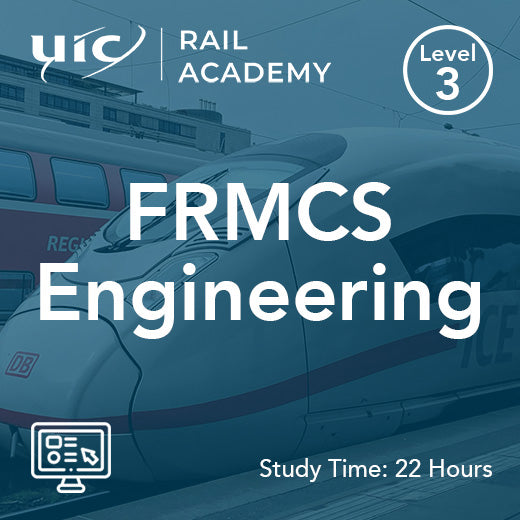
FRMCS Engineering V2 (On-Demand)
GSM-R end of life is anticipated to be around 2030 which only leaves a few years to find a replacement system. The International Union of Railways (UIC) have published a document called FRMCS- Future Railway Mobile Communications System which outlines what will be required of a future system. The railway community have detailed the communications requirements of the future railway networks and are looking for telecommunications manufacturers and standards bodies to provide a suitable solution. This technical course is aimed at engineers planning to deploy FRMCS as a successor to GSM-R. It identifies the specifications for FRMCS, the design aims, architecture of the On-Board systems, trackside systems and the transport network. Additionally, the course details the capabilities of FRMCS, operational procedures and looks at possible migration scenarios with GSM-R. Now fully updated to include FRMCS V2 specifications. Prerequisites Attendees ideally will have a background in telecommunications gained from working in the railway industry and have technical knowledge of GSM-R. Who would benefit? The course is open to anyone that would like to gain an insight into how mobile telecommunications for railways may migrate from GSM-R to the system known as FRMCS. This self-paced on-demand distance learning course features illustrated course books, videos, tests and full tutor support. Topic Areas Include FRMCS – An Introduction FRMCS Reference Architecture FRMCS On-Board Architecture FRMCS Trackside Components Voice Application Subsystem FRMCS Location and Positioning System 5G FRMCS Addressing The SIP Core Mission Critical Architecture and Procedures FRMCS Operation Radio Planning and Migration MCVideo Certified by Institution of Railway Signal Engineers (IRSE) The Institution of Railway Signal Engineers (IRSE) certifies that the syllabus for the FRMCS Engineering course is appropriate for meeting the stated objectives of that course. For more information about the scope of the certification process provided by the IRSE please see the IRSE website www.irse.org.
£2,275.00
-

Cloud Architecture and Technologies (On-Demand)
Cloud computing underpins much of today’s digital infrastructure - but what exactly makes the cloud work? This short, single-module course demystifies the architecture and technologies behind cloud services, giving you a structured overview of how cloud systems are designed, deployed, and secured. In just three hours, you’ll explore the core cloud types - public, private, hybrid - and learn the key terminology that underpins modern cloud discussions. You’ll then look at the enabling technologies that support cloud computing, from virtualisation and containerisation to software-defined infrastructure and automation. The course goes on to explain how cloud services are architected, including layered service models, the roles of cloud orchestration and APIs, and how infrastructure is provisioned dynamically. You’ll also examine how cloud environments are managed and secured, with a focus on governance, monitoring, data protection, and access control. Ideal for technical professionals and learners seeking a deeper understanding of how cloud platforms work, this course equips you with the vocabulary, concepts, and architectural knowledge needed to confidently engage in cloud-related conversations and planning. Course Contents Cloud – Types and Terminology Cloud Technology Cloud Architecture and Services Cloud Management and Security
£95.00
-
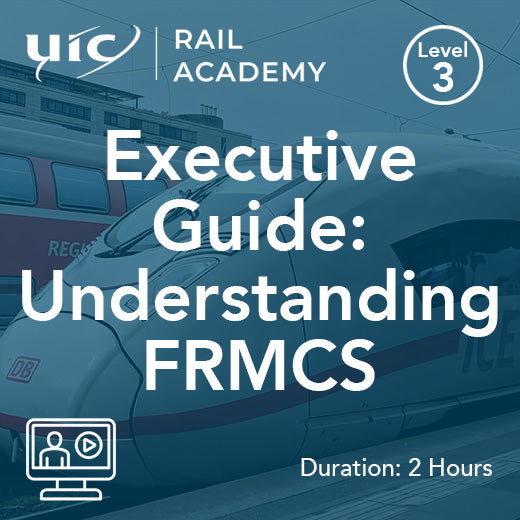
Executive Guide: Understanding FRMCS
This concise executive briefing provides a high-level overview of the Future Railway Mobile Communication System (FRMCS), the next-generation communication standard for railways, is designed to assist executives seeking to understand the impact and opportunities arising from this new technology. The course explains what FRMCS is, the implication of some of the technical changes on the requirements for physical assets, why it is essential, and the implementation timeline for the migration from GSM-R. Participants will explore the architectural framework, key challenges in deployment, and the business opportunities it presents. Designed for busy executives, this course delivers practical insights in an accessible format.Prerequisites No prior knowledge of FRMCS, GSM-R, or telecommunications is required. This course is designed for those new to the topic, ensuring all acronyms are explained, and foundational concepts are introduced. Who Would Benefit Executives outside of rail companies charged with understanding the business impact or opportunity of FRMCS to their business, for example those already working in the railway ecosystem, those seeking business development opportunities in the rail sector, or those within the telecommunications sector seeking to explore the opportunity offered by FRMCS. Sales professionals preparing for client meetings or presentations involving railway communication systems. Business development / strategy development executives / managers exploring opportunities in the rail and telecom sectors. Policy-makers and regulators overseeing railway digitalisation efforts.Engineers and project managers who need a foundational understanding of FRMCS to support project planning or cross-functional collaboration. Course Contents Introduction GSM-R: The Context Why GSM Needs Replacement Introducing FRMCS FRMCS Challenges Stakeholders and Business Opportunities Timeline
POA: Private Course
-
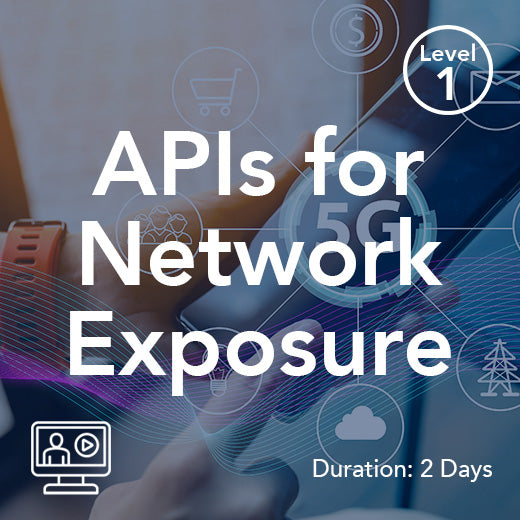
APIs for Network Exposure - From 3GPP Standards to Open Gateway Initiatives
Data networks are the foundation of modern communication systems, making it crucial for professionals in telecoms, IT, and related fields to have a strong grasp of networking fundamentals. Wray Castle's FN22SH Data Networks course offers a concise and accessible overview of how data networks function, setting the stage for further exploration in networking, internet technologies, or telecommunications. In just three hours, participants will delve into essential concepts such as the structure of data networks, packet-switching, Ethernet protocol, and the TCP/IP model that drives internet communication. This course also sheds light on key internet operations and services, providing valuable insights into the global connectivity infrastructure. Designed for technical professionals and beginners with minimal experience, FN22SH Data Networks is a perfect starting point for individuals looking to gain confidence in the principles of data networking. By the end of the course, participants will have a solid understanding of how data moves efficiently and reliably across digital systems, empowering them to navigate the intricacies of modern communication networks with ease. With a curriculum covering topics like background to computer networking, packet-switching principles, Ethernet protocol, TCP-IP, and internet operations and services, participants will gain a comprehensive understanding of the fundamental principles that underpin data networks. Whether you are new to the field or seeking a refresher, this course equips you with the essential knowledge needed to comprehend the intricate workings of data networking in today's interconnected world. Prerequisites Basic understanding of telecommunications concepts. Some knowledge or experience of packet-switched data network operation and Internet technology is beneficial. General knowledge about 4G and 5G. Course Contents Introduction to Network Applications API Standards and Definition Protocols for APIs communication and Modelling Languages API Development Tools (Demo) NEF Services APIs NEF Procedures Future trends in API Integration Course Director: Maziar Shoaie Maziar is a seasoned telecommunications trainer with over 23 years of experience. He has delivered courses in more than 45 countries to customers from all over the world, including operators, vendors, and integrators. He is a core-network specialist with expertise in 2G, 3G, 4G, and 5G networks. and the developer of the Wray Castle 5G Lab and Workshop.
£1,815.00
-

5G – Standalone, Enablers for the Industry & Business Perspective (On-Demand)
With SA 5G, we witness the evolution of mobile networks, from being reliant on legacy infrastructure, to achieving true independence - and unlocking unprecedented capabilities that enables 5G to support a much wider range of industrial use cases. In this course, we guide you through the benefits and challenges of deploying Standalone 5G, exploring its architectural advancements, unique features, and the benefits it brings to both consumers and businesses. We then highlight the enhanced capabilities and expanded use cases made possible by key technology enablers - including network slicing, edge computing, virtualization, non-terrestrial networks (NTNs), network exposure, and network automation. We discuss the impact of 5G SA for network operators, service providers, and enterprises - exploring the opportunities and challenges that arise in the deployment and management of advanced 5G networks. Who Would Benefit Ideal for anyone needing clarity on 5G trajectory – including capabilities & use cases Prerequisites A basic appreciation of the telecoms landscape – both technical and business Course Contents 5G Base Capabilities A Business Perspective 5G Standalone (SA) 5G Enablers for Industry
£95.00
-
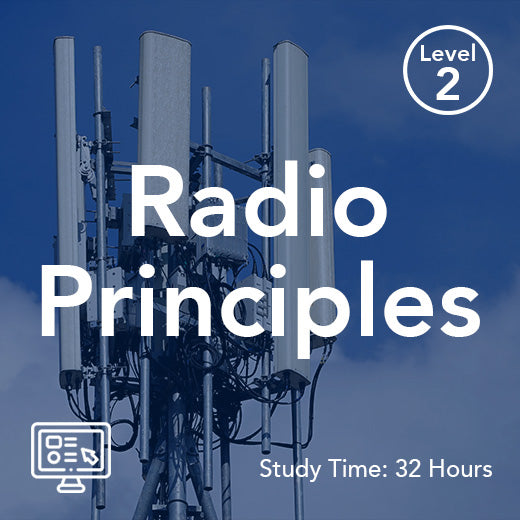
Radio Principles (On-Demand)
The world has seen a phenomenal growth in the application and use of radio technology. What haven’t changed, however, are the principles upon which all of these technologies are built.The Radio Principles course provides an in-depth understanding of these principles on which radio technologies are built, taking students on a logical and detailed path through the various aspects of the theory, and practice, of radio communications. Through attendance on this course, delegates will build an understanding of how radio works and how this impacts manufacturers, users and operators of radio technology. Who would benefit Those requiring an understanding of the principles and concepts of radio that underpin today’s radio technologies. Prerequisites Some experience in telecommunications engineering is beneficial but the course is also suitable for delegates with an aptitude for technical subjects. Topic Areas Include The use and management of the radio spectrum Waveform fundamentals and baseband information Power levels and measurementsAnalogue and digital modulation techniques Simplex, semi-duplex and duplex - FDD and TDD Multiplexing – FDMA, TDMA, CDMA and OFDMA Transmitters and receivers Antennas and transmission lines Radio propagation mechanisms Introduction to coverage prediction Principles of cellular coverage techniques Diversity and MIMO An overview of fixed and mobile radio technologies in use today
£2,660.00
-
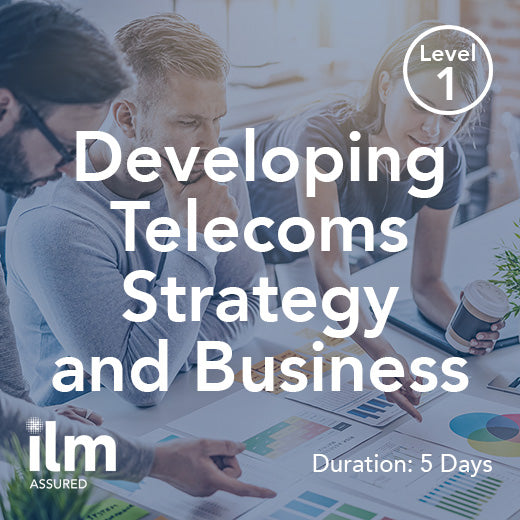
Developing Telecoms Strategy and Business
The Developing Telecoms Strategy and Business explores the key areas for business success, bringing the concepts together within a comprehensive team-based business simulation that runs throughout the programme - allowing the ideas to be developed and applied to a realistic and challenging simulated environment. The programme delivers comprehensive training for mid-senior managers, directors, specialists, consultants and identified talent working within the telecommunications, connected innovation, and adjacent industries. This programme has been assured by ILM. Assured status provides validation and recognition for the learner. It is a symbol of learning excellence and quality and is a reassurance that the training undertaken meets best practice standards. Focused Modules: Industry, Business & Tech Insight Telecoms Technology Evaluating & Optimising Business Models Controlling the Finances Leading, Developing & Supporting Effective People Creating & Communicating Compelling Customer Propositions Maintaining Effective Governance Optimising & Transformation (incl. Platforms & Processes) Who should attend? The programme is ideal for those in a telecoms-related management, leadership, or consultancy position within: Corporate organisations , working to ... grow and develop new and existing departments or divisions align departments or divisions to corporate strategy and vision Growing businesses that are making the transition to a sustainable long-term proposition Start-up departments Successfully complete the Developing Telecoms Strategy & Business to: Rapidly enhance your knowledge and competencies in the key areas of telecoms business. Establish a Blueprint for effectively leading your business or team. Implement all key aspects of the blueprint consistently and coherently. Develop more effective strategies, key performance enablers, and business models. Focus on maximising value creation for your organisation and your customers. Develop a solid understanding of telecoms technology and deployment options and how this impacts the business. Break those silo barriers. Better lead, support, and enhance the performance of your people. Take a more active role in evolving company culture, innovation and processes. Assess ideas and opportunities more rigorously and take a more dynamic leadership role. About ILM ILM is the UK's leading provider of leadership. coaching and management qualifications and training. We work with organisations in all sectors to help them define, develop and embed the leadership and management capability they need to succeed.ILM provides qualifications in leadership and management, coaching and mentoring and specialist areas such as social enterprise. We accredit 2,500 training experts to deliver our qualifications globally. Venue: King's Building, King's College London The King's Building, located on the Strand Campus. This historic landmark and stunning architectural masterpiece is a hub for innovation, learning, and cultural exchange. King's Building offers a unique blend of rich history and modernity, making it the perfect place for professional development and thought leadership. "The best classes I’ve attended focusing on Telco industry, very insightful and spot-on" CSC“Trainers were excellent. Really like how lively the classroom was, the class participation and energy is vibrant and positive.” CWC"Excellent training with great knowledge for the telecom industry" MS
POA: Private Course
-
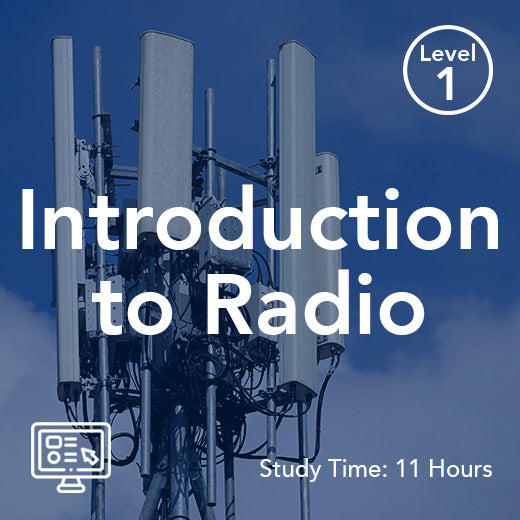
Introduction to Radio (On-Demand)
Expand your knowledge of radio technology with our Introduction to Radio Training Course. This short online self study course will provide you with a comprehensive understanding of how the radio spectrum is managed, the systems that utilize spectrum, and the technical aspects of radio system design. Whether you are a senior executive, manager, regulator, market analyst, or marketeer in the telecommunications industry, this course is designed to equip you with the knowledge and insights necessary to navigate the complexities of radio spectrum management. Our course covers a wide range of topic areas, including how radio spectrum is regulated, the concepts of bandwidth and channels, antenna characteristics, radio wave propagation mechanisms, and the impact of interference and noise. Additionally, you will gain an overview of various radio systems such as 2G, 3G, and 4G, and explore the factors driving the demand for spectrum. This course is tailored for individuals with no technical background, making it accessible to a diverse range of professionals seeking to enhance their understanding of radio technology. Join us for our Introduction to Radio Training Course and stay ahead of the curve in the ever-evolving world of radio technology. Gain valuable insights into the management and use of radio spectrum, align radio applications to frequency bands, and explore the latest advancements driving the demand for spectrum. Don't miss this opportunity to expand your knowledge and expertise in radio technology. This self-paced on-demand distance learning course features illustrated course books, videos, tests and full tutor support. Who would benefit Senior executives, managers, regulators, market analysts and marketeers involved in the telecommunications industry who require an understanding of the wide range of issues surrounding the use and management of radio spectrum. Prerequisites This course is designed for those with no technical background. Topic Areas Include How radio spectrum is managed and regulated How radio spectrum is used The concepts of bandwidth and channels An introduction to the characteristics of antennas Radio wave propagation mechanisms The impact of interference and noise Aligning radio applications to frequency bands Overview of radio systems – including 2G, 3G and 4G What is driving the demand for spectrum? Health and Safety issues
£500.00
-
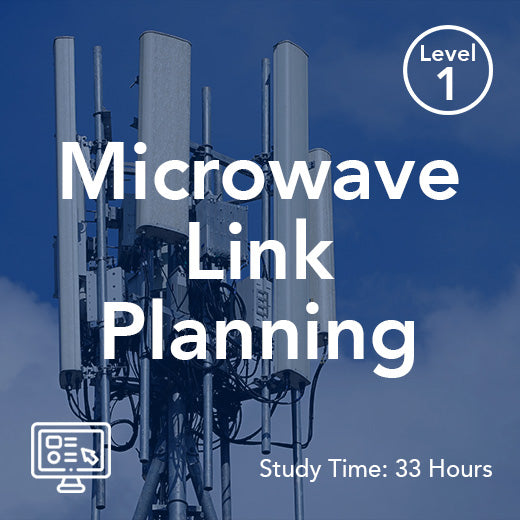
Microwave Link Planning (On-Demand)
The course covers all of the essential aspects of planning point-to-point microwave link systems, from conception to commissioning. Who would benefit Those involved in the specification, planning and maintenance of fixed microwave radio transmission, backhaul and access links. Prerequisites A good knowledge of radio principles, or a background in telecommunications engineering, or attendance on the Radio Principles course (RP1301). Topic Areas Include ITU-R and CEPT recommendations ETSI standards Spectrum management and channel plans Frequency assignment Digital radio performance characteristics Noise and interference in radio systems Reliability, availability and performance objectives Microwave antennas and feeders Radiation Pattern Envelopes (RPEs) Refraction, k-factor, reflection and diffraction Path profiling and Fresnel zone clearance Power budgets Rain and Multipath/Dispersive fade margins Dimensioning space and frequency diversity Interference management Practical link planning exercises Practical exercises, including design of a fixed link transmission network. On-Demand Online Training Our self-paced on-demand distance learning programmes are accessible on any computer, tablet or smartphone and allow you to study at a time and location that is convenient to you. Each course includes: Illustrated Course Books - featuring leading edge knowledge from subject matter experts. Videos - Detailed videos expand the points covered in the course books, discussing topics in greater depth. Tutor Support – Dedicated course tutors are available to answer any questions you might have throughout your studies. Formative Assessment - Modules include regular quizzes to support learning by testing your knowledge of the subject matter. Certification– Successfully complete the end of module tests to earn Digital Badges to demonstrate the depth of your knowledge of the topic. Also available as a Live Online Training, Learn more
£2,660.00
-
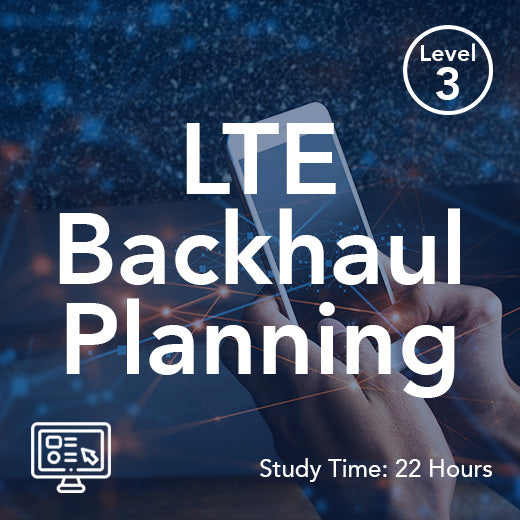
LTE Backhaul Planning (On-Demand)
This course provides a detailed overview of the issues related to the planning of backhaul services designed to support 4G LTE Cellular sites in both dedicated and single Radio Access Network (RAN) environments. The course focuses on planning techniques related to the most commonly-employed backhaul technologies used in conjunction with LTE, such as Ethernet, packet-based microwave and IP. It also covers aspects such as timing and security solutions and presents techniques that can be employed to estimate backhaul requirements and plan for suitable deployments. Join our LTE Backhaul Planning Training Course to gain a comprehensive understanding of the planning techniques and technologies essential for supporting 4G LTE Cellular sites. This course is designed for engineers working for network operators involved in the planning and implementation of RANs, specifically focusing on the backhaul region from the cell tower back to the core network. You will learn about backhaul technologies such as Ethernet, packet-based microwave, and IP, as well as timing and security solutions crucial for LTE deployments. Our 1-day course covers topics including backhaul overview, defining 4G backhaul requirements, transport network evolution, synchronization options, VLAN management, and more. By the end of the training, you will be equipped with the knowledge and skills to estimate backhaul requirements, plan suitable deployments, and ensure efficient backhaul solutions for 4G LTE networks. No specific prerequisites are required for this course, making it accessible to a wide range of professionals in the telecom industry. Sign up now to enhance your expertise in LTE backhaul planning and stay ahead in the rapidly evolving telecommunications sector. This course is delivered as a self-paced on-demand distance learning course and features illustrated course books, videos, tests and full tutor support. Who would benefit This course is designed for engineers working for network operators in the planning and implementation of RANs and in particular the backhaul region from the cell tower back to the core network and are looking at the options that exist to provide backhaul solutions suitable for 4G LTE networks. Prerequisites No specific prerequisites for this course although a good understanding of mobile networks and in particular the radio access part of 3GPP based networks. Topic Areas Include Backhaul overview Backhaul planning techniques Defining 4G backhaul requirements Backhaul technologies appropriate for 4G networks Transport network evolution Multi RAT and Multi Operator (MRMO) Synchronization options Cell throughput expectations Industry initiatives and forums Radio to transport QoS mapping VLAN management Backhaul traffic profile Backhaul QoS Planning exercise – cell throughput calculations On-Demand Online Training Our self-paced on-demand distance learning programmes are accessible on any computer, tablet or smartphone and allow you to study at a time and location that is convenient to you. Each course includes: Illustrated Course Books - featuring leading edge knowledge from subject matter experts. Videos - Detailed videos expand the points covered in the course books, discussing topics in greater depth. Tutor Support – Dedicated course tutors are available to answer any questions you might have throughout your studies. Formative Assessment - Modules include regular quizzes to support learning by testing your knowledge of the subject matter. Certification– Successfully complete the end of module tests to earn Digital Badges to demonstrate the depth of your knowledge of the topic. Included in Wray Castle Hub This course is also available as part of the Wray Castle Hub. An annual subscription delivers unlimited access to this course and over 500 hours of learning material consisting of 30+ Courses, 190+ Learning Modules, and 1,000+ Videos. Annual Subscription: £1400 (Most cost-effective option) Subscribe to Wray Castle Hub here
£500.00
-
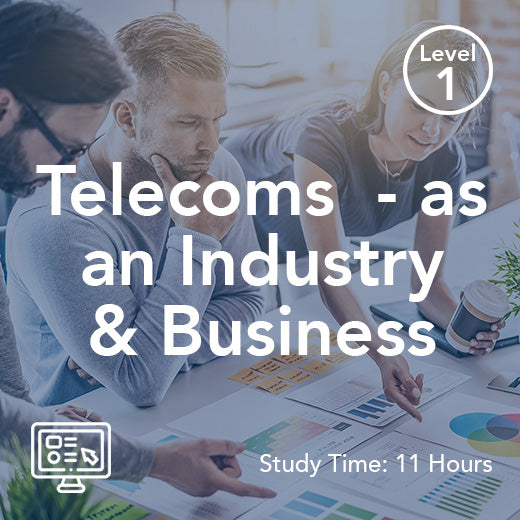
Telecoms – as an Industry and Business (On-Demand)
The Telecoms Industry is based on a range of technologies that are extremely diverse, wide ranging, and highly complex. With this foundation, the industry is able to support a wide variety of service propositions in a significant number of identifiable sectors, and as a result, a vast array of business models. The complex business ecosystems are comprised of many thousands of companies and the relationships that exist between them. This includes Communications Service Providers (CSP), Network Equipment and Handset Vendors, Service / Support Companies, Standardisation Bodies, Regulators, and Content / Media Companies. The ecosystems are dynamic in nature and evolving rapidly in terms of focus. The sheer scale of it all makes it difficult to fully understand and analyse, but in this course, we start that process. We explore the overall make-up of the industry and the business dynamics; the types of organisations involved and their roles and relationships; the service propositions; and main customer segments. We also briefly consider company strategy and business models. An evaluation of the key technologies that support the industry is made, including projections, time-lines and overall market trajectories. Topic Areas Include: Telecoms Industry and Business Dynamics The Technology Explained and Evaluated Telecoms Industry and Market Update
£500.00
-
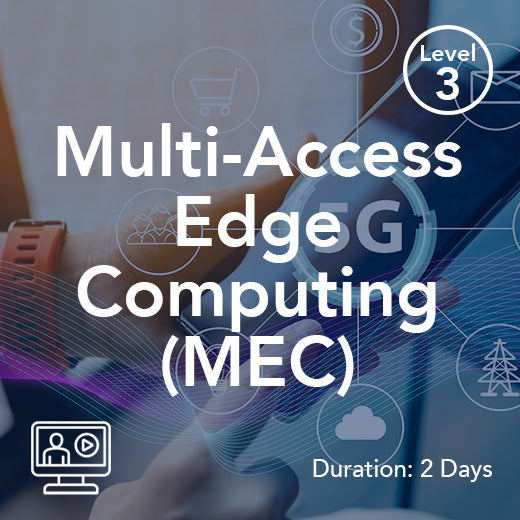
Multi-Access Edge Computing (MEC)
Multi-Access Edge Computing (MEC) is a cutting-edge technology that brings computation and data storage closer to the end-users, enabling faster processing and reduced latency. Our MEC training course dives deep into the MEC architecture, enabling technologies such as Cloud, NFV, and 4G/5G, and explores real-world MEC use cases. Led by industry expert John Timms, this course provides a comprehensive overview of MEC standards and APIs, as well as hands-on experience in developing MEC applications and services. With a focus on practical applications and collaborative methods, participants will gain valuable insights into building MEC solutions and conducting proof of concept studies. Whether you are new to MEC or looking to enhance your existing knowledge, this 2-day online training course is designed to equip you with the skills and expertise needed to succeed in the rapidly evolving field of Multi-Access Edge Computing. Don't miss this opportunity to learn from a seasoned professional and take your MEC knowledge to the next level. Topic Areas Include Introduction Enabling Technologies (Cloud and NFV) Enabling Technologies (4G/5G) MEC Architecture Use Cases MEC standards and APIs Annex A Detailed Use Case Study Speaker: John Timms John Timms is an experienced trainer in IP, VoIP, IPTV, NFV/SDN and IMS/LTE Core. John is also a former Telemanagement Forum Subject Matter Expert and specialist in QoE for VoIP/VoLTE and IP video services.
£1,815.00
-
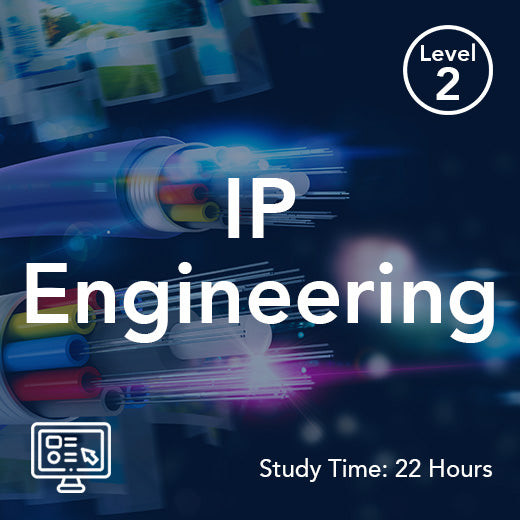
IP Engineering (On-Demand)
This comprehensive IP Engineering on Demand course provides a deep dive into Internet Protocol networks, covering engineering techniques, applications, protocols, and switching methods. Participants will gain the knowledge and skills needed to confidently navigate the IP environment, with topics including QoS, security, VPNs, and Multimedia over IP. Ideal for those looking to understand how IP networks are designed and implemented, this course is perfect for individuals seeking to enhance their expertise in this critical area. Participants in this course should have some prior knowledge or experience with packet-switched data network operation and Internet technology. The course covers a range of topic areas, including the background of the Internet and ISPs, the Data Link, IP, Transport, and Application layers, IPv6, DNS, MPLS, access services, routing in IP networks, OSPF, BGP4, IP QoS technologies, security engineering, IP VPNs, and IP multimedia services. By the end of the 22-hour course, participants will have a solid understanding of IP networks and the skills to work effectively in this dynamic environment. Who would benefit Those needing to understand how IP networks are designed and implemented. Prerequisites Some knowledge or experience of packet-switched data network operation and Internet technology is beneficial. Topic Areas Include: Background to the Internet and ISPs The Data Link, IP, Transport and Application layers IPv6 The Domain Name System (DNS) Introduction to MPLS Access services E-mail services and web hosting Name servers and heterogeneous networks Peering Routing in IP networks Overview of OSPF and BGP4 IP QoS technologies Security engineering IP VPNs IP multimedia services
£750.00
-

5G Technologies, Services and Markets (On-Demand)
This 5G Technologies, Services and Markets on-demand course is a non-technical introduction to the 5G mobile communication system, including its capabilities, general structure and operation, as well as its position as a development of previous technologies. The course also covers the place that 5G holds in the telecommunications market, and how that is developing. This 1-day training course is designed to provide a comprehensive overview of 5G technologies, services, and markets. The course covers the basics of 5G mobile communication systems, including their capabilities, structure, and operation, as well as their evolution from previous technologies. Participants will also gain insights into the current landscape of the telecommunications market and the role that 5G plays in shaping its future. Ideal for non-technical professionals in the mobile or fixed telecommunications sector, this course requires no prior technical knowledge but some familiarity with the industry would be beneficial. Topics covered include an introduction to 5G, market drivers, use cases, performance objectives, key features, network architectures, voice services, industry players, standardization, and the relationship between 5G, LTE, and Wi-Fi. By enrolling in this course, participants will gain a solid understanding of 5G technologies and their impact on the telecommunications industry. Stay ahead of the curve and enhance your knowledge with this engaging and informative training opportunity. This self-paced on-demand distance learning course features illustrated course books, videos, tests and full tutor support. Who would benefit This course is intended for non-technical professionals either new to, or already working in, the mobile or fixed telecommunications sector. Prerequisites No technical knowledge is assumed but some familiarity with the telecommunications industry would be beneficial. Topic Areas Include Introduction to 5G Market drivers for 5G Use cases for 5G Performance objectives and spectrum requirements Concepts and key features of 5G Architecture of the core and radio access networks of 5G Voice services in 5G Key industry and market players Standardisation and timelines for 3GPP and the ITU 5G, LTE and Wi-Fi – a holistic approach
£95.00
-
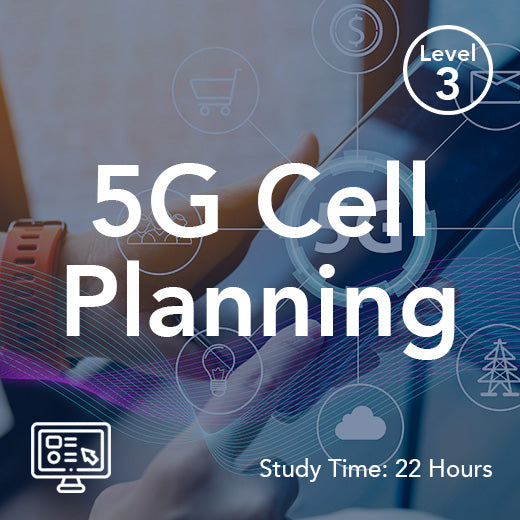
5G Cell Planning (On-Demand)
Our 5G Cell Planning training course is designed to provide network planning engineers with the essential knowledge and skills needed to effectively plan radio access networks for 5G. Through practical worked examples and in-depth discussions, participants will gain a solid understanding of coverage and capacity estimations, RF KPIs, signal measurements, and parameters that impact the random access process. By the end of the course, students will be equipped with the theoretical knowledge and practical tools to confidently plan 5G cells and optimize network performance. Whether you are new to 5G cell planning or looking to enhance your existing skills, this training programme is suitable for anyone with a background in telecommunication systems and radio network planning. Join us and take your 5G cell planning expertise to the next level. Don't miss out on the opportunity to advance your career in 5G cell planning. Enroll in our live online training course today and gain valuable insights into the fundamentals of the 5G air interface, link budget estimation, coverage estimation, capacity estimation, and more. For a self-paced learning option, check out our On-Demand Training Programme and start mastering 5G cell planning at your own pace. This self-paced on-demand distance learning course features illustrated course books, videos, tests and full tutor support. Who Would Benefit This course is intended for network planning engineers, who wish to learn about the issues that are involved when planning radio access networks for 5G. Prerequisites The course assumes familiarity with telecommunication systems and with the principles of radio network planning. Some understanding of radio network planning for LTE, and of the 5G air interface, would be beneficial. Topic Areas Include Fundamentals of the 5G Air Interface Link Budget Estimation Coverage Estimation Fundamentals of the 5G Air Interface Link Budget Estimation Coverage Estimation
£750.00
-
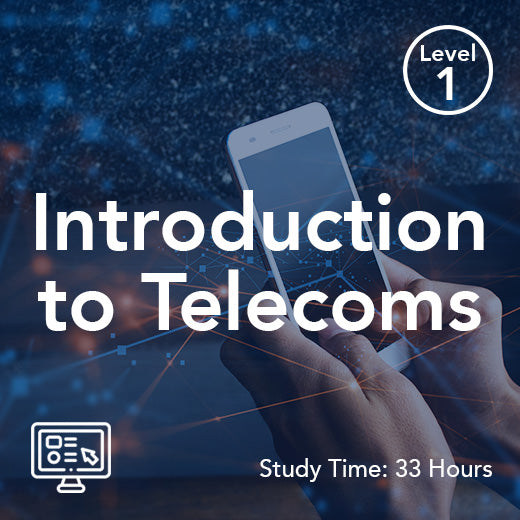
Introduction to Telecoms (On-Demand)
The Introduction to Telecoms Training Course is designed to provide participants with a comprehensive understanding of the core technologies used in fixed, mobile, and IP-based telecoms networks. Learners will delve into the fundamentals of networking technologies, including switching, transmission, and signalling, as well as the services that they support. The training also covers next-generation networking in an all-IP environment, ensuring that participants are equipped with the knowledge needed to excel in the telecommunications industry. Ideal for those currently working in or looking to enter the telecommunications field, this course is perfect for individuals who need a solid grasp of the functions and services offered by modern networks. Participants should have a basic mathematical ability and a technical aptitude, with the intention to pursue a technical role in the industry. By exploring topics such as telecoms evolution, network components and services, and mobile cellular systems, attendees will gain valuable insights into the ever-evolving world of telecommunications. This self-paced on-demand distance learning course features illustrated course books, videos, tests and full tutor support. Who would benefit Those working in or entering the telecommunications industry who need to understand the functions and services provided by modern networks. Prerequisites Mathematical ability and aptitude for technical subjects, with the intention to progress in a technical role. Topic Areas Include Telecoms evolution Network components and services The PSTN and ISDN: access and core networks Basic analogue and digital information concepts Time division multiplexing and switching techniques Transmission systems: PDH, SDH, WDM and OTN Mobile cellular systems: 2G, 2.5G, 3G and 3.5G Packet-switched techniques IP, Ethernet, the Internet, ISPs and Internet Services Fixed and Mobile Broadband access technologies Next Generation fixed and mobile networks IP Multimedia Subsystem Also available as a Live Online Training Programme, learn more.
£2,660.00
-
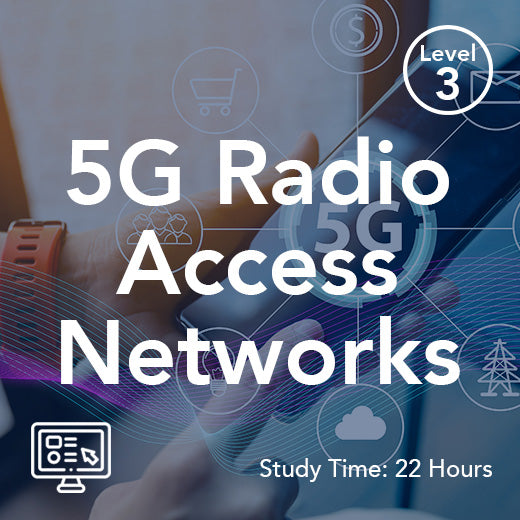
5G Radio Access Network (On-Demand)
Our 5G Radio Access Network training course is designed to provide professionals in the telecommunications industry with the knowledge and skills needed to effectively design, deploy, and manage 5G networks. In this course, participants will learn about the key concepts and technologies behind 5G RAN, including massive MIMO, beamforming, and network slicing. Our expert trainers will guide you through hands-on exercises and real-world case studies to help you gain practical experience in implementing 5G RAN solutions. By enrolling in our 5G RAN training course, you will be equipped with the latest industry insights and best practices to stay ahead in the rapidly evolving telecommunications landscape. Whether you are a network engineer, system architect, or project manager, this course will provide you with the tools and expertise needed to drive successful 5G RAN deployments. Join us at Wray Castle and take your career to the next level with our comprehensive 5G Radio Access Network training course. This self-paced on-demand distance learning course features illustrated course books, videos, tests and full tutor support. Who Would Benefit Engineers that need to know about the 5G Radio Access Network in terms of its characteristics, architecture, interfaces and operation Prerequisites Ideally students will have a mobile telecommunications or radio background gained from the study of or working with GSM, UMTS or LTE networks. Topic Areas Include Introduction to 5G 5G RAN NG Interface Messages and Procedures Xn Interface Messages and Procedures E1 Interface Messages and Procedures F1 Interface Messages and Procedures Multi-RAT Dual Cennectivity
£750.00
-
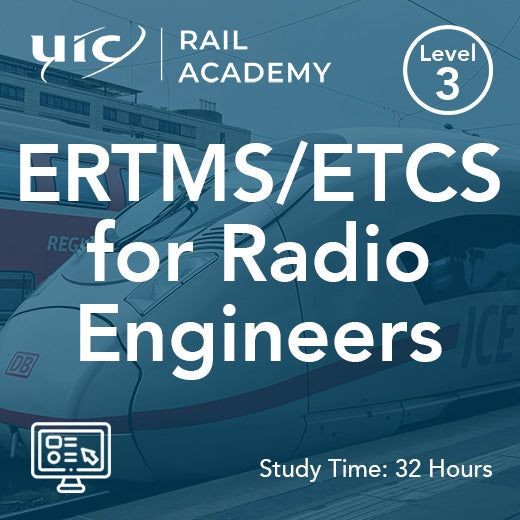
ERTMS/ETCS for Radio Engineers (On-Demand)
The European Railway Traffic Management System (ERTMS) is a crucial rail project in Europe, aiming to replace disparate train control systems with the European Train Control System (ETCS). Our 3-day training course provides an in-depth look at ETCS and focuses on utilizing GSM-R with or without GPRS as a bearer for ETCS signaling. This course is part of the UIC Rail Academy and is certified by the Institution of Railway Signal Engineers (IRSE). Participants in this course should have a basic understanding of GSM-R networks. Topics covered include ERTMS standards and legislation, system architecture, operating modes, protocols, circuit-switched signaling, GPRS for ETCS, radio network optimization, and more. Upon completion, attendees will have a comprehensive understanding of how GSM-R technologies can support the implementation of ETCS in railway systems. For those looking for a more flexible learning option, this course is also available as a self-paced online training course. Visit our website to learn more about how you can enhance your knowledge of ERTMS/ETCS for radio engineers at your own pace. This self-paced on-demand distance learning course features illustrated course books, videos, tests and full tutor support. Part of UIC Rail Academy. Prerequisites Delegates attending this course should be familiar with the principles of GSM-R networks. Topic Areas Include ERTMS Standards and Legislation Basic System Description System Architecture ERTMS Operating Modes ERTMS/ETCS Protocols Circuit Switched Signalling Circuit Switched Connections GPRS for ETCS The GPRS Air Interface GPRS Procedures Transmission through the Network Radio Network Optimization Certified by Institution of Railway Signal Engineers (IRSE) The Institution of Railway Signal Engineers (IRSE) certifies that the syllabus for the ERTMS/ETCS for Radio Engineers course is appropriate for meeting the stated objectives of that course. For more information about the scope of the certification process provided by the IRSE please see the IRSE website www.irse.org. On-Demand Online Training Our self-paced on-demand distance learning programmes are accessible on any computer, tablet or smartphone and allow you to study at a time and location that is convenient to you. Each course includes: Illustrated Course Books - featuring leading edge knowledge from subject matter experts. Videos - Detailed videos expand the points covered in the course books, discussing topics in greater depth. Tutor Support – Dedicated course tutors are available to answer any questions you might have throughout your studies. Formative Assessment - Modules include regular quizzes to support learning Certification– Successfully complete the end of module tests to to demonstrate the depth of your knowledge of the topic. Also available as a Live Online Training Programme, learn more.
£2,670.00
-
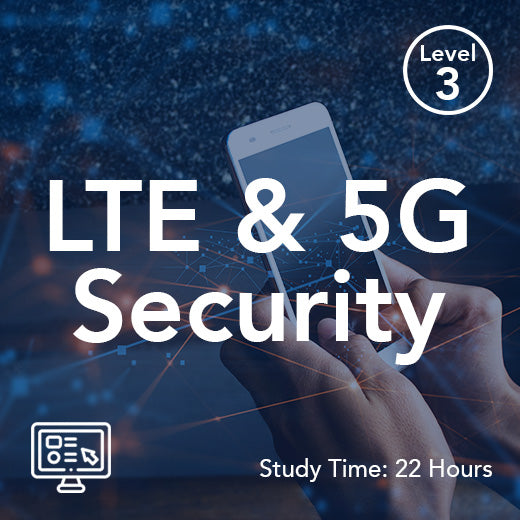
LTE and 5G Security (On-Demand)
LTE and 5G systems play a crucial role in our modern communication landscape, with the potential to revolutionize how we connect and interact with our devices. As these technologies become more prevalent, ensuring the security of our data and privacy becomes paramount. The LTE and 5G Security On-Demand Training Course offered by Wray Castle provides a comprehensive overview of the security measures implemented in LTE and 5G networks, covering key aspects such as authentication, key agreement, and network security protocols. This self-paced distance learning course delves into the intricacies of LTE and 5G security architectures, exploring the evolution from LTE to 5G and the security enhancements introduced in the latest generation of cellular networks. Participants will gain a deep understanding of the security procedures and key derivation methods used in both Non-standalone and Standalone Modes of 5G networks, as well as the authentication and interworking protocols involved in ensuring a secure communication environment. Designed for engineers, managers, and technical professionals working in the telecommunications industry, this course is also beneficial for individuals looking to broaden their knowledge of LTE and 5G security protocols. Whether you are new to the field or have prior experience in telecoms, this training course will equip you with the essential skills and insights needed to navigate the complex security challenges posed by LTE and 5G networks. This self-paced on-demand distance learning course features illustrated course books, videos, tests and full tutor support. Who would benefit This course is designed for engineers, managers and other personnel who have a need to acquire a technical overview of the security environment employed within LTE and 5G networks. It will also be of benefit to those in the wider technical community who have a need to understand the security protocols employed by cellular networks. Prerequisites Attendance on, or equivalent knowledge, LTE Engineering or 5G Engineering would be useful. Alternatively, experience working in this area of telecoms. Topic Areas Include LTE Security Architecture Authentication and Key Agreement Evolution to 5G 5G Non-Standalone Mode Security 5G Standalone Mode Security
£750.00
-
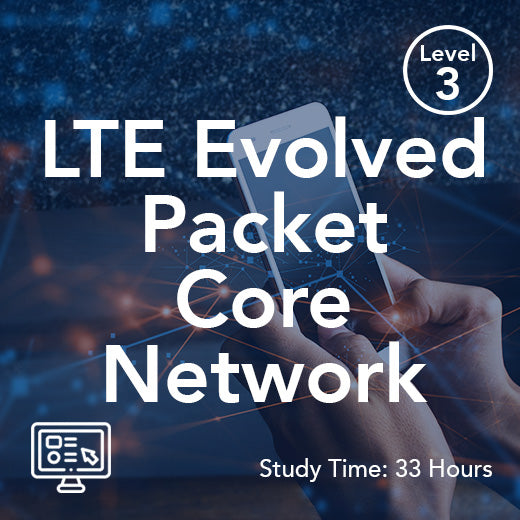
LTE Evolved Packet Core Network (On-Demand)
Our LTE Evolved Packet Core Network Training Course is designed to provide a comprehensive technical understanding of the Evolved Packet Core (EPC) for LTE systems. In this course, participants will learn about EPC architecture, interfaces, service provision concepts, application of IP technologies, overall protocol architectures, and optionally, a review of IMS functionality Engineers and other staff involved with switching or transmission architecture, optimization, network management, network testing, or monitoring of the EPC would greatly benefit from this training. Participants are expected to have an engineering background with some knowledge of core network technologies, including IP. Experience with 2G or 3G systems would also be beneficial for a better understanding of the course material. The course covers a wide range of topic areas, including the high-level architecture of LTE, functions of key EPC components like MME, S-GW, PDN-GW, HSS, and PCRF, LTE state diagrams, inter-operation with 2G, 3G, and non-3GPP networks, voice options for LTE, principles of bearers and Quality of Service (QoS), data transport in the EPC, policy and charging control architecture, IETF and 3GPP protocols in the EPC, power-on procedures, UE procedures in idle and connected modes, enhancements in LTE-Advanced, and optionally, an overview of the functions and architecture of the IMS. This self-paced on-demand distance learning course features illustrated course books, videos, tests and full tutor support. Who would benefit Engineers and other staff involved with switching or transmission architecture, optimization, network management, network testing or monitoring of the EPC. Prerequisites An engineering background with some knowledge of core network technologies, including IP, is assumed. Experience of 2G or 3G systems would be beneficial. Topic Areas Include High level architecture of LTE Functions of the MME, S-GW, PDN-GW, HSS and PCRF LTE state diagrams Inter-operation with 2G, 3G and non-3GPP networks Voice options for LTE Principles of bearers and Quality of Service (QoS) Data transport in the EPC Policy and charging control architecture IETF protocols in the EPC, including SCTP, DiffServ and Diameter 3GPP protocols in the EPC, including GTP and S1-AP Power-on procedures UE procedures in idle and connected modes Enhancements in LTE-Advance
£950.00
-
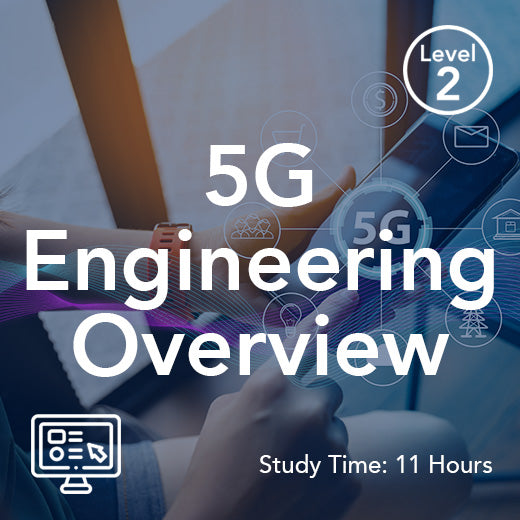
5G Engineering Overview (On-Demand)
This 5G Engineering Overview course is a technical overview of 5G. The course includes the design goals and development schedule for 5G, and the principles and architecture of the 5G air interface, radio access network and core network. This 5G Engineering Overview training course provides a comprehensive technical overview of 5G, including its design goals, development schedule, and the principles and architecture of the 5G air interface, radio access network, and core network. Engineers new to or already working in mobile communications will benefit from this course, gaining valuable insights into the latest advancements in 5G technology. Participants in this course are assumed to have familiarity with general engineering and telecommunications terminology, with some understanding of LTE cellular systems being beneficial. The course covers a range of topic areas, including 5G introduction and key features, standardization and timelines for 3GPP and the ITU, use cases and performance objectives, radio spectrum and millimeter wave communications, principles of radio transmission and reception in 5G, radio access network architecture, non-standalone and standalone deployment options, core network architecture, network function virtualization and network slicing, and interworking and compatibility between 5G, LTE, and Wi-Fi. Overall, this 5G Engineering Overview training course offers a valuable opportunity for engineers to deepen their understanding of 5G technology and its implications for mobile communications. This self-paced on-demand distance learning course features illustrated course books, videos, tests and full tutor support. Who would benefit This course is intended for engineers either new to, or already working in, mobile communications. Prerequisites Familiarity with telecommunications and general engineering terminology is assumed. Some understanding of LTE cellular systems would be beneficial. Topic Areas Include 5G introduction and key features Standardisation and timelines for 3GPP and the ITU Use cases and performance objectives Radio spectrum and millimetre wave communications Principles of radio transmission and reception in 5G Radio access network architecture Non standalone and standalone deployment options Core network architecture Network function virtualisation and network slicing Interworking and compatibility between 5G, LTE and Wi-Fi
£500.00
-

Mini-MBA in Telecoms – a Blueprint for Future Business
A comprehensive Telecoms Mini-MBA programme covering all the essential elements needed to effectively lead and manage in Telecoms and related industries The Mini-MBA in Telecoms explores the key areas for business success, bringing the concepts together within a comprehensive team-based business simulation that runs throughout the programme - allowing the ideas to be developed and applied to a realistic and challenging simulated environment. This programme delivers comprehensive training for mid-senior managers, directors, specialists, consultants and identified talent working within the telecommunications, connected innovation, and adjacent industries. Focused Modules: Industry, Business & Tech Insight Telecoms Technology Evaluating & Optimising Business Models Controlling the Finances Leading, Developing & Supporting Effective People Creating & Communicating Compelling Customer Propositions Maintaining Effective Governance Optimising & Transformation (incl. Platforms & Processes) Who should attend? The programme is ideal for those in a telecoms-related management, leadership, or consultancy position within: Corporate organisations , working to ... grow and develop new and existing departments or divisions align departments or divisions to corporate strategy and vision Growing businesses that are making the transition to a sustainable long-term proposition Start-up departments Mini-MBA in Telecoms - Key benefits: Successfully complete the Mini-MBA in Telecoms to: Rapidly enhance your knowledge and competencies in the key areas of telecoms business. Establish a Blueprint for effectively leading your business or team. Implement all key aspects of the blueprint consistently and coherently. Develop more effective strategies, key performance enablers, and business models. Focus on maximising value creation for your organisation and your customers. Develop a solid understanding of telecoms technology and deployment options and how this impacts the business. Break those silo barriers. Better lead, support, and enhance the performance of your people. Take a more active role in evolving company culture, innovation and processes. Assess ideas and opportunities more rigorously and take a more dynamic leadership role. "The best classes I’ve attended focusing on Telco industry, very insightful and spot-on" CSC“Trainers were excellent. Really like how lively the classroom was, the class participation and energy is vibrant and positive.” CWC"Excellent training with great knowledge for the telecom industry" MS
POA: Private Course
-
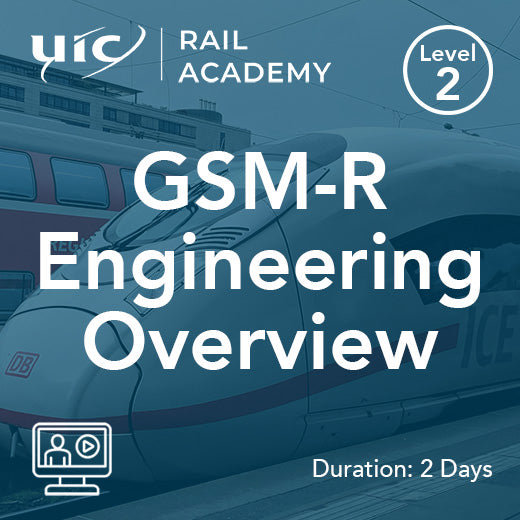
GSM-R Engineering Overview (Live)
The 2-day GSM-R Engineering Overview Training Course offered by Wray Castle is a comprehensive program designed for network engineers looking to deepen their understanding of GSM-R networks and operations. Part of the UIC Rail Academy, this course covers all principles of GSM-R networks and provides a detailed study of the services, features, and technology involved. Ideal for individuals in technical roles within the rail industry, this course offers a broad overview of GSM-R services and technology. Participants will gain insights into GSM and GSM-R networks, network architectures, identities, coverage, procedures, and the European Train Control System. A basic understanding of cellular radio networks and railway signaling is recommended as a prerequisite for this course. Who would benefit Those in or entering technical roles within the GSM-R industry who require a broad overview of the services, features and technology of GSM-R. Prerequisites A basic understanding of cellular radio networks and railway signalling, as well as the ability to comprehend technical subjects, would be useful. Topic Areas Include Introduction to GSM and GSM-R Networks GSM Network Architecture GPRS Network Architecture GSM-R Network Architecture GSM-R Services GSM-R Identities GSM-R Coverage Network Access GSM-R Procedures European Train Control System Certified by Institution of Railway Signal Engineers (IRSE) The Institution of Railway Signal Engineers (IRSE) certifies that the syllabus for the GSM-R-Engineering course is appropriate for meeting the stated objectives of that course. For more information about the scope of the certification process provided by the IRSE please see the IRSE website www.irse.org. Also available as a Self-Study Online Learning Programme, learn more.
£1,815.00
-
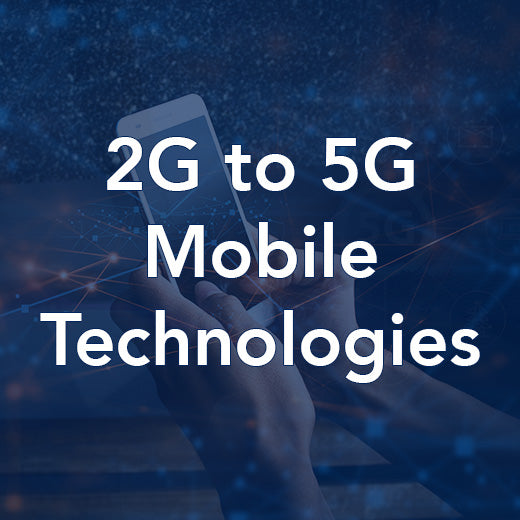
2G to 5G Mobile Technologies
Our 2G to 5G Mobile Technologies Training Course is designed to provide professionals in the telecommunications industry with the knowledge and skills needed to understand and work with the latest mobile technologies. With the rapid evolution of mobile networks, staying up-to-date with the latest advancements is crucial for professionals looking to advance their careers in this field. Our comprehensive course covers everything from the basics of 2G technology to the cutting-edge developments in 5G networks.By enrolling in our training course, participants will gain a deep understanding of the principles and technologies behind 2G, 3G, 4G, and 5G networks. They will learn about the key features and capabilities of each generation, as well as the challenges and opportunities presented by the transition to 5G. Our expert instructors will guide participants through hands-on exercises and real-world case studies to ensure they have the practical skills needed to succeed in this dynamic industry.Whether you are a seasoned professional looking to upgrade your skills or a newcomer to the telecommunications field, our 2G to 5G Mobile Technologies Training Course will provide you with the knowledge and expertise needed to excel in this fast-paced industry. Stay ahead of the curve and advance your career with our industry-leading training program. Prerequisites A basic understanding of telecoms principles would be beneficial. Topic Areas Include: An overview of basic radio and cellular techniques and technologies Network Generations from 2G to 5G 3GPP Release programme An overview of 2G (GSM) network architecture and functionality GSM TDMA air interface operating principles GPRS and EDGE upgrades to GSM GSM services TETRA networks An overview of 3G (UMTS) network architecture and functionality UMTS WCDMA air interface operating principles HSPA and HSPA+ upgrades to UMTS An overview of 4G (LTE) network architecture and functionality LTE OFDMA air interface operating principles Evolved Packet Core (EPC) operation Small cells and heterogeneous networks Self Organising Networks (SON) LTE voice options LTE Advanced and LTE Advanced Pro Wi-Fi/Cellular interworking LTE operation in unlicensed frequency bands Machine Type Communications (MTC) LTE for public safety Introduction to 5G 3GPP use cases for 5G Performance targets for 5G Radio Spectrum for 5G 5G OFDMA air interface 5G System Architecture Non Standalone (NSA) and Standalone (SA) New Radio (NR) 5G Core Network Functions Trainer: Les Granfield Les is a technical trainer with 35 years of experience. His expertise extends across a wide range of telecommunications technologies. He specializes in GSM, GSM-R, ERTMS/ETCS, UMTS and LTE radio access networks, radio planning, radio access network optimization and Push to Talk over Cellular (PoC).
£1,815.00
-
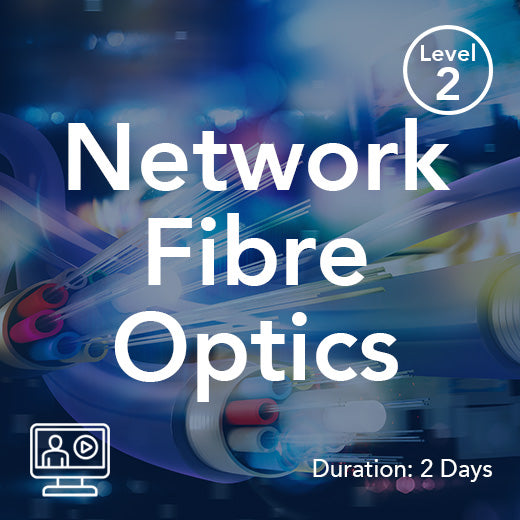
Network Fibre Optics
This course provides an overview of fibre optic communication systems, from fundamental principles to advanced applications. It begins with the basics of signal processing and wavelength division multiplexing, then explores high-speed data transmission and the methods used to design and optimise optical networks. Then it moves to the practical aspects of network planning and installation before ending with an examination of emerging trends in fibre optics, offering insight into the future of the fibre optic industry. Course Contents Signal Processing Basics Wavelength Division Multiplexing (WDM) High-Speed Data Transmission over Fibre Optical Network Design and Optimisation Network Planning and Installation Emerging Trends in Fibre Optics
POA: Private Course





























































